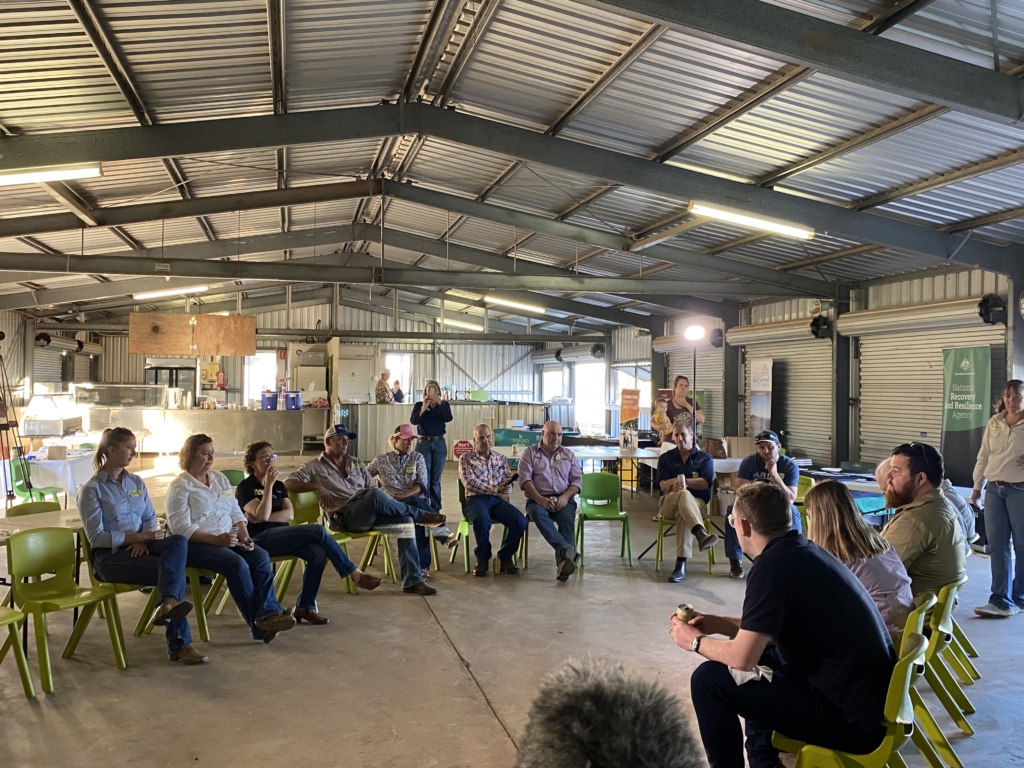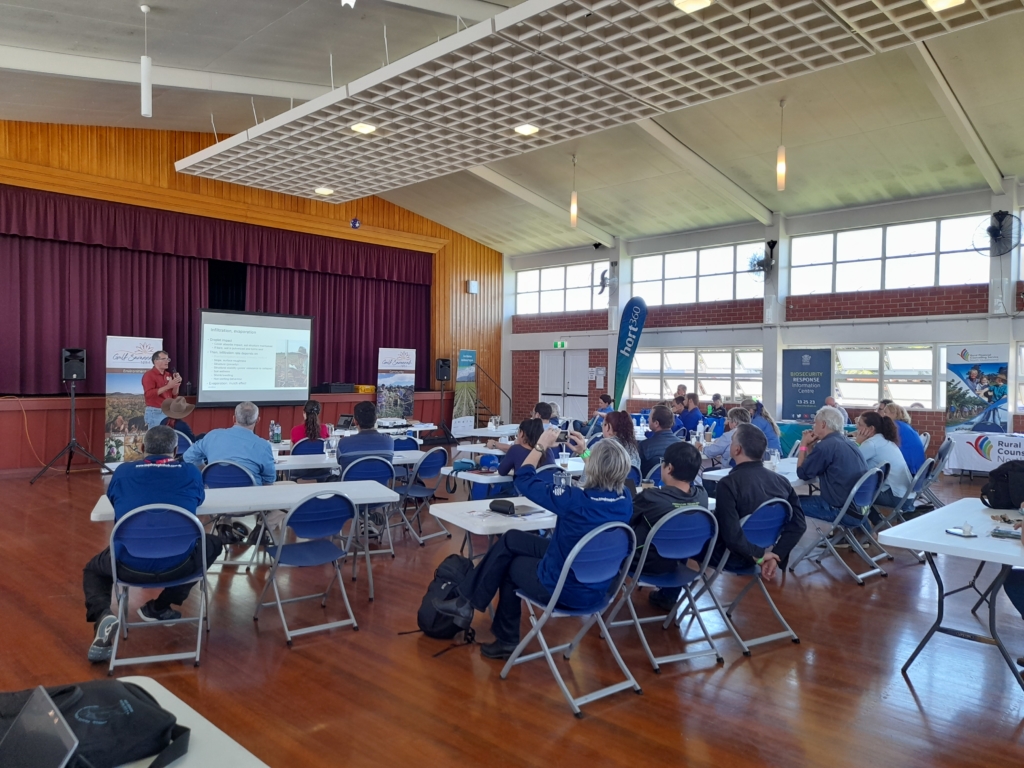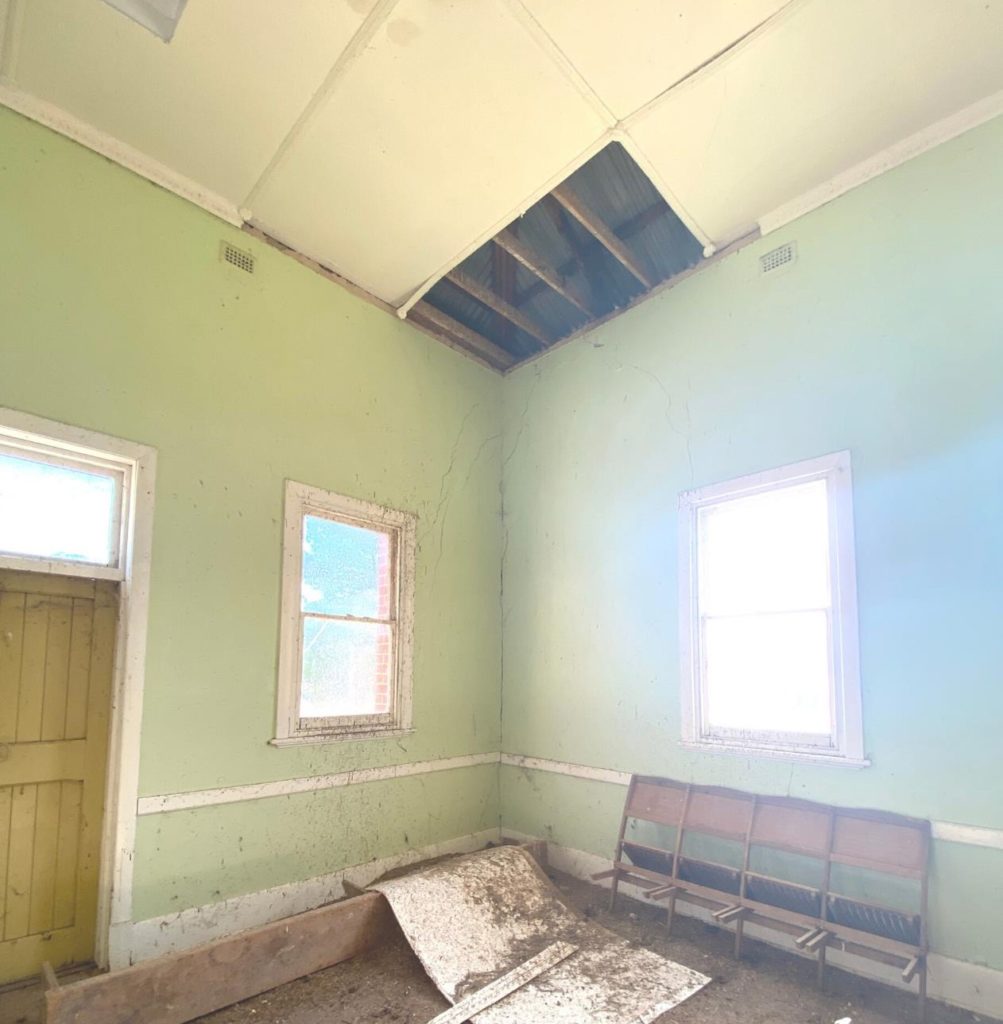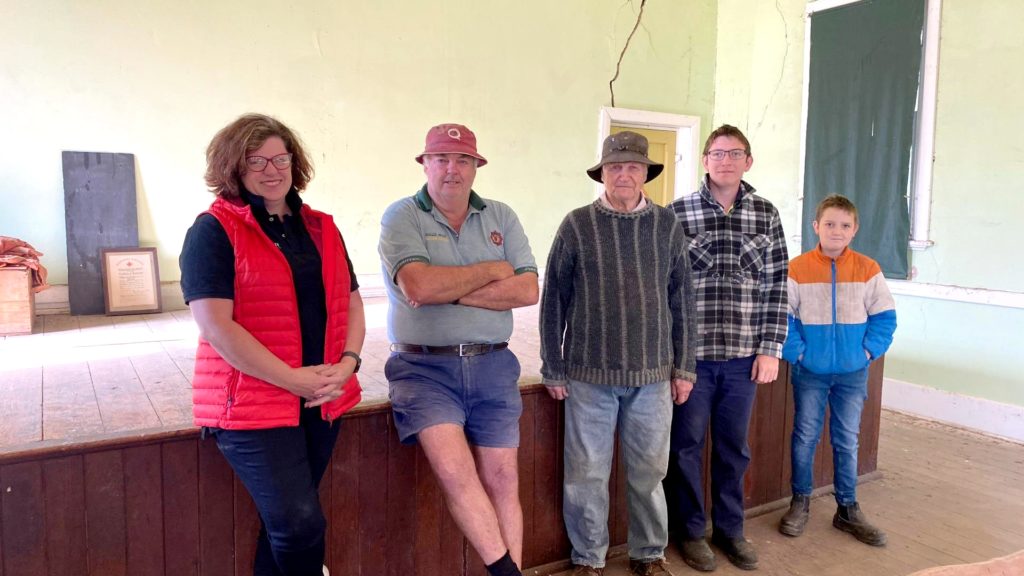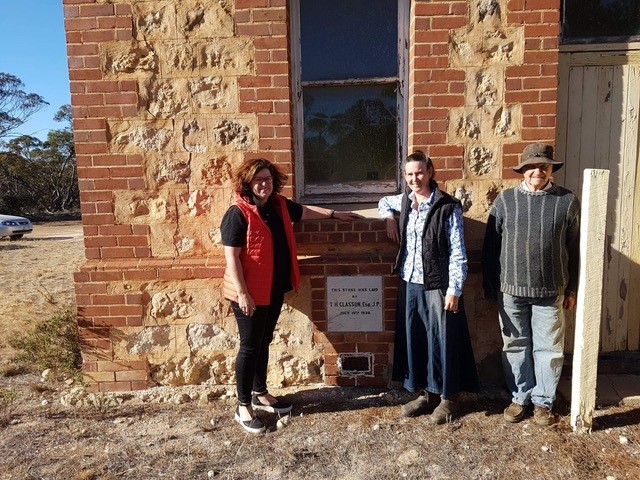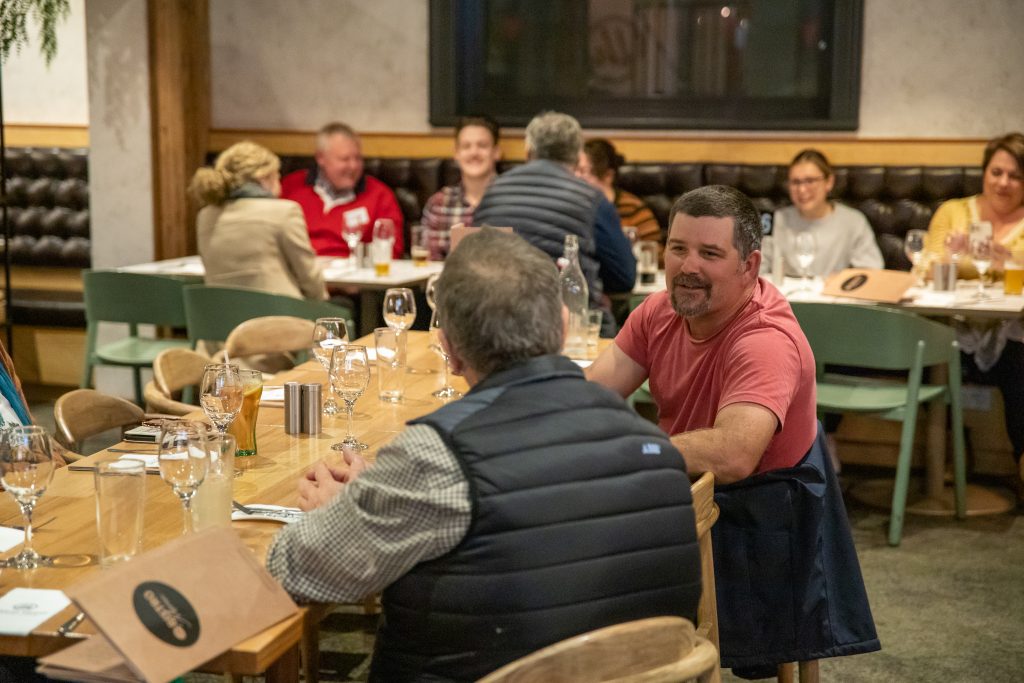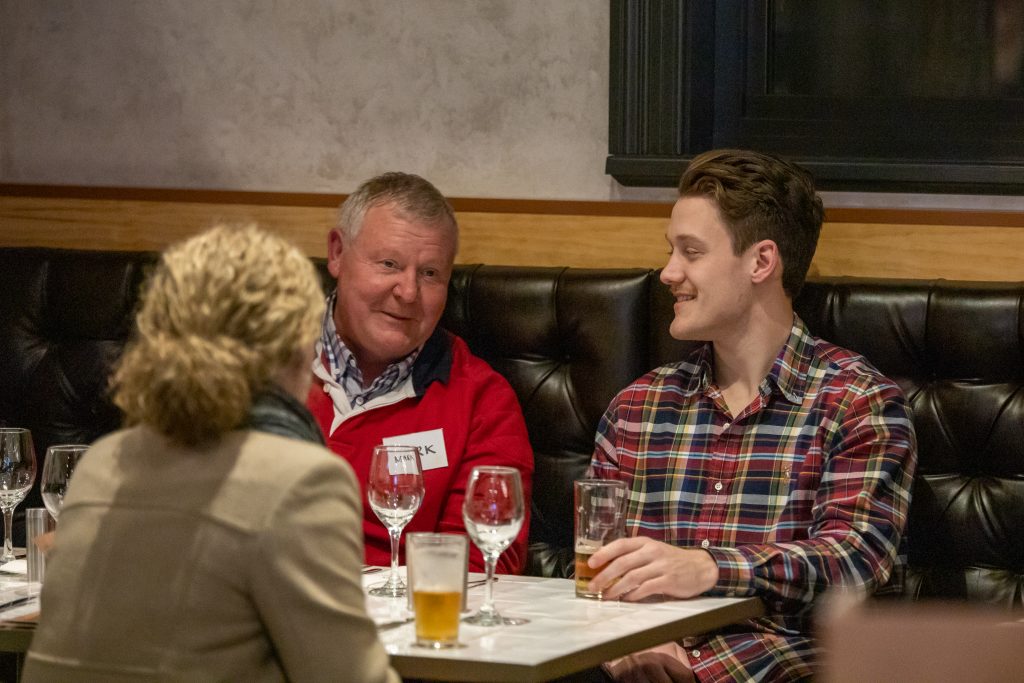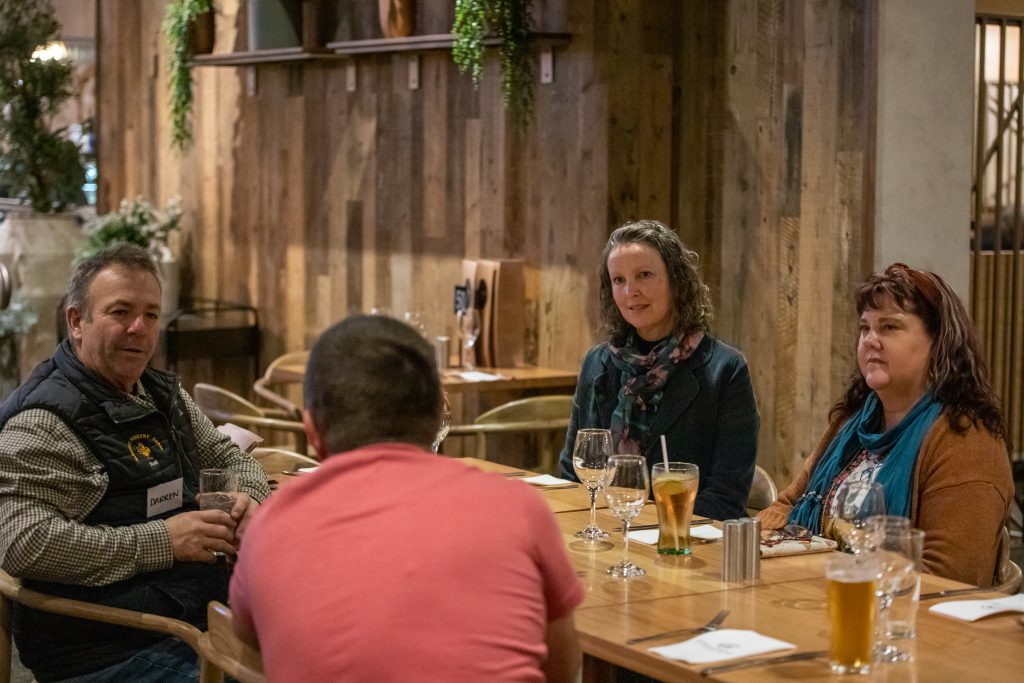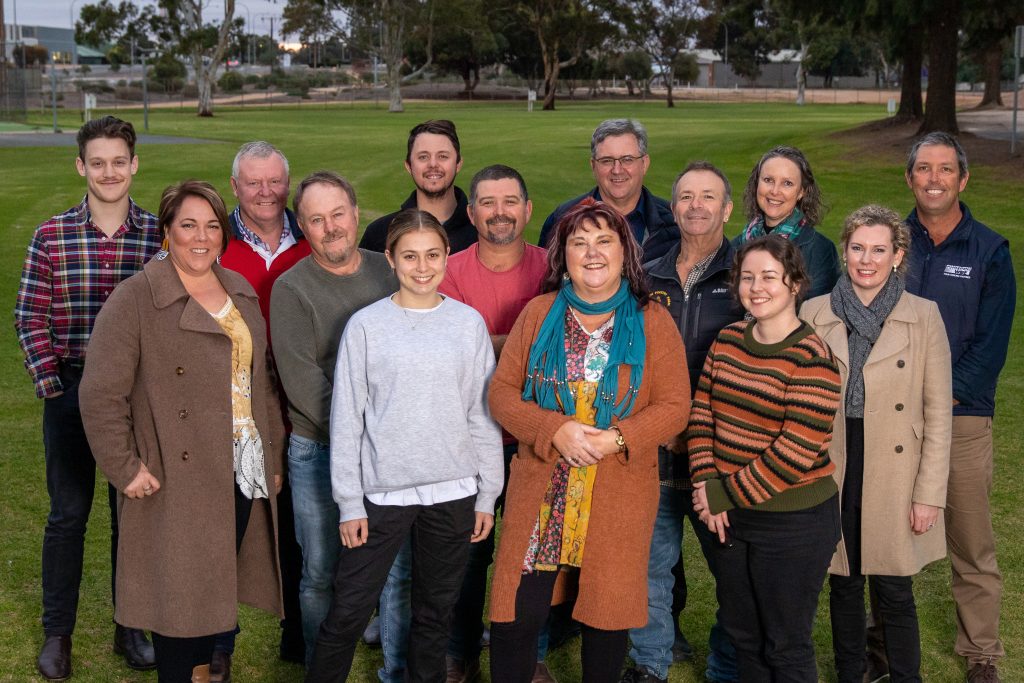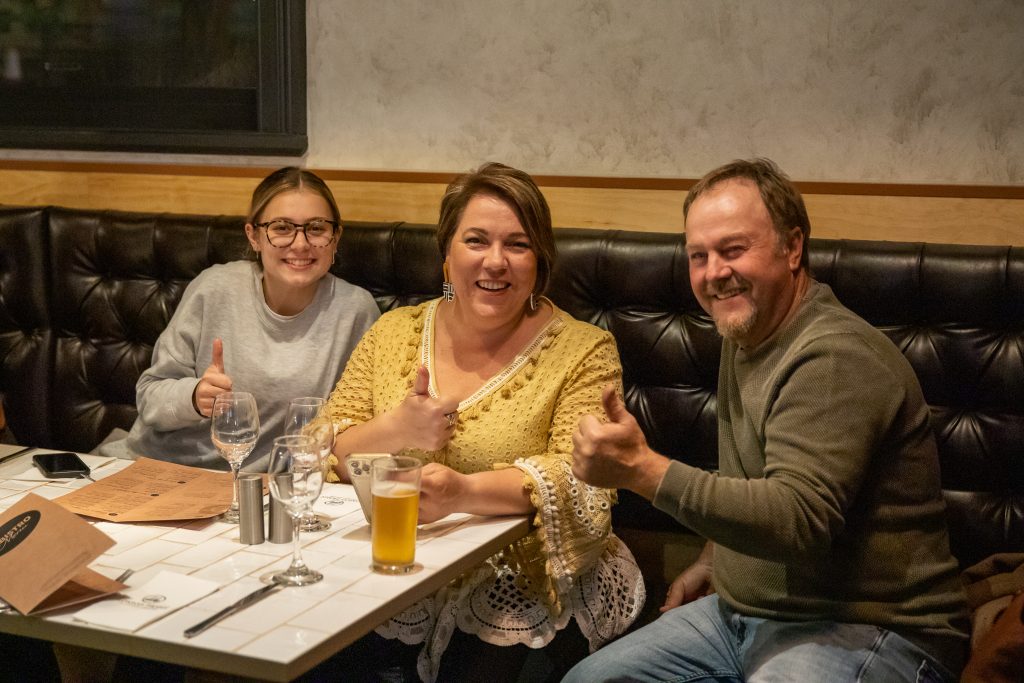Foundation for Rural & Regional Renewal (FRRR)
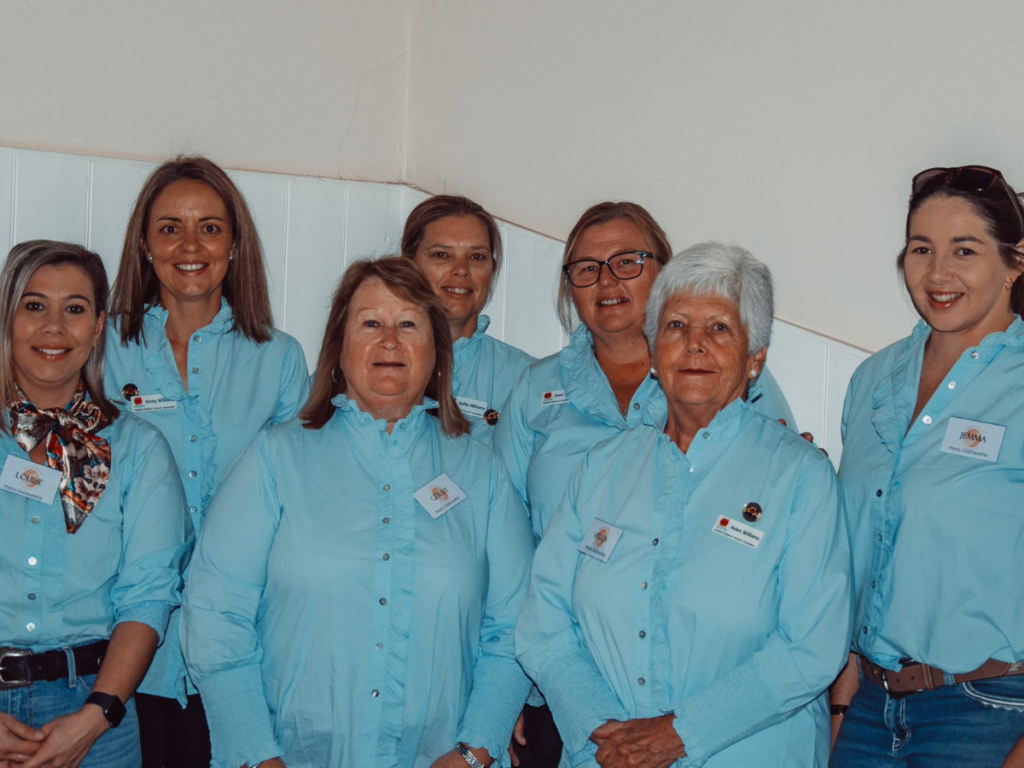
While the population of the South Australian Arid Lands is small, with just 24,000 people to a 525,000km2 area, there is a strong and proud community spirit. Many families and people volunteer in community and government-led organisations, on top of their personal responsibilities. In the face of severe drought conditions, it can be difficult to maintain this spirit of resilience. Between 2017 to 2020, the region experienced one of the worst droughts on record. Every landscape, community, business and family in the region continues to feel the impact of that drought to this day. Communities in this region must adapt and prepare for educating children in a very different way to their city counterparts, given the ever-changing impacts of seasonal weather, including drought.
Isolated Children’s Parents Association Marla-Oodnadatta (ICPA) is responsible for organising an annual state conference designed to enhance and enlighten agriculture-dependent communities and drive local action to assist in preparing for future challenges. This year’s ICPA conference was partially funded by a $5,000 FRRR grant awarded through the Community Impact Program, funded by the Australian Government’s Future Drought Fund as part of the Helping Regional Communities Prepare for Drought Initiative.
By hosting the conference in Quorn, the ICPA made it easier for their members throughout SA to voice any concerns in relation to educating geographically isolated children. They reported that 35 separate organisations and 150 individuals participated.
They also organised a family-friendly, post-conference event to attract and engage the involvement of more men and families in the ICPA. Festivities included a town treasure hunt put together by Rural Aid, face painting, glitter tattoos, an auction, and a 20/20 cricket game between the ICPA men and Quorn cricket club.
By securing the grant, ICPA enabled their volunteer member base to attend the conference at no charge, strengthening connections and setting themselves up well to achieve great outcomes long into the future.
Kirsty Williams, the Marla-Oodnadatta Branch President said that it is great to have support for regional and remote groups like the ICPA. “Being volunteers, the support of FRRR makes our job that little bit easier.”
First round of Small Network Grants benefit 29 NFPs
FRRR has awarded $737,774 in Small Network Grants to 29 not-for-profit organisations (NFPs) working in remote, rural and regional Australia for projects that will strengthen the capacity and capability of their communities to prepare for, and be resilient to, the impacts of future droughts.
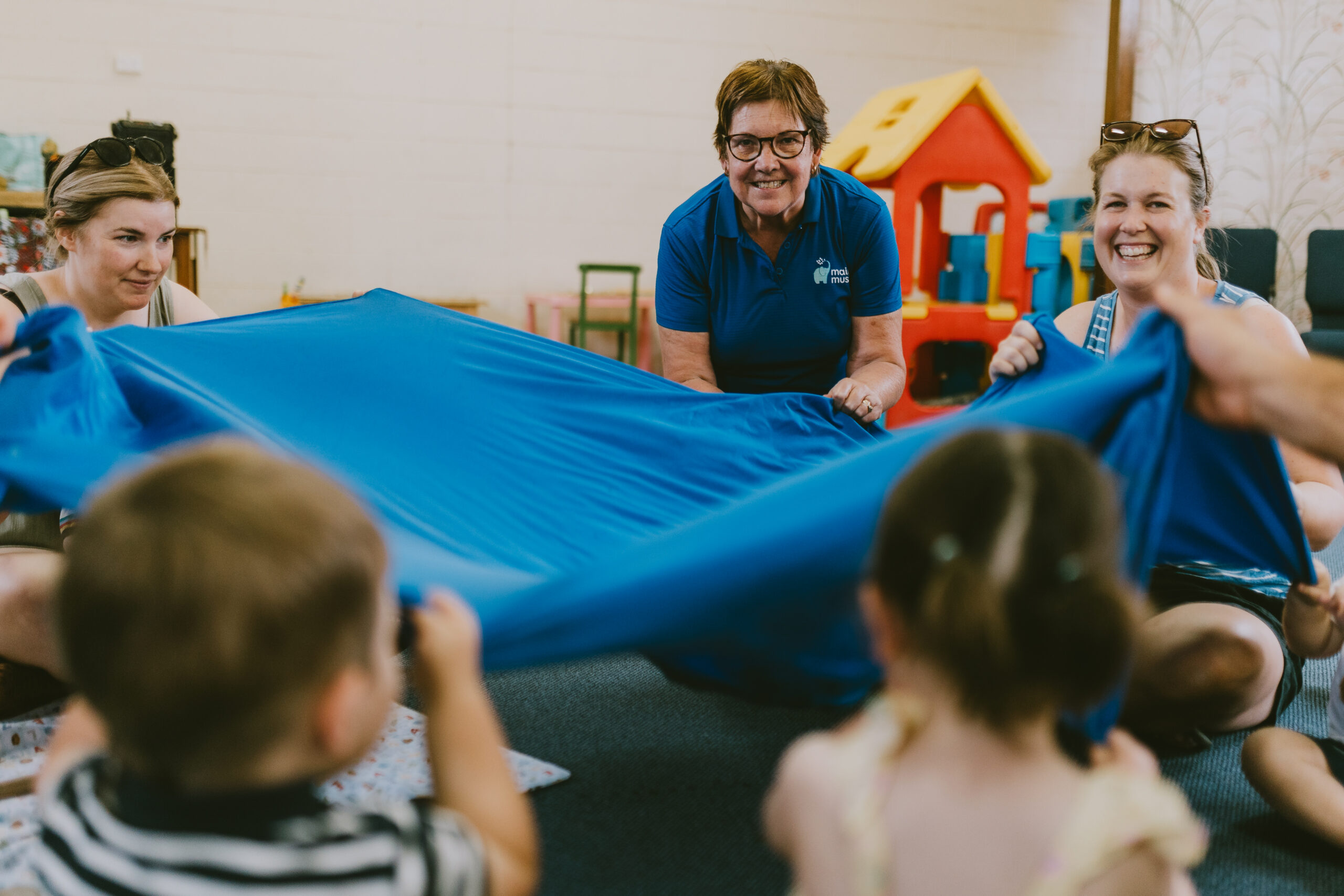
The Small Network Grants program is supported by the Australian Government’s Future Drought Fund through the Helping Regional Communities Prepare for Drought Initiative.
Funded projects are diverse, including a Mental Health forum in Junee, NSW; a series of community connection and education events in Alice Springs, NT; a portable toilet to support small-scale community infrastructure projects in Boonah, QLD; a demonstration day for the new digital weather station and soil probe network in Kingscote, SA; Accidental Counsellor training for the Tasmanian community of Triabunna; a Field Day for local secondary students in Birchip, VIC; and a series of natural resources management and drought education sessions in the Great Southern WA region of Kendenup.
Nina O’Brien, FRRR’s Disaster Resilience and Recovery Lead, said strong interest in the program indicates that organisations and local leaders are actively seeking ways to inspire their communities to connect, communicate and strengthen social capital, so they can better withstand the impacts of future drought.
“Most of the applications we saw in this round of the Small Network Grants program were for projects designed to improve communication, social connection and collaboration within and between communities, as a way of strengthening and preparing for drought.
“Far North West Joint Organisation’s Drought Resilience Community Action Group is a great example of this type of initiative. With a $50,000 grant, the Action Group will help the communities of Bourke, Brewarrina, Walgett and Cobar to increase knowledge and resource sharing and promote collaboration, so that the NSW Far West region can be better prepared.
“More than half of the applications we received have never been funded by FRRR. This means we are reaching grassroots organisations and responding to the increased priority around drought preparedness in many remote, rural and regional communities, many of which are still recovering from other climate-related disasters like cyclone and flooding.
“We look forward to seeing how these projects help community groups be better connected, informed and resourced in the next drought,” Ms O’Brien said.
Applications for Round 2 of Small Network Grants are open now and close 26 March 2024, with recipients announced in June 2024.
Potential applicants are encouraged to watch this recorded webinar to learn more about the program and the eligibility requirements: https://www.youtube.com/watch?v=1DHpeNQqPeI.
For more information, including the list of eligible LGAs, and to apply, visit: https://frrr.org.au/small-networks-grants.
The full list of grant recipients and their projects are below.
| Organisation | Project | Location | Grant | |||
|---|---|---|---|---|---|---|
| Small Networks Grants Round 1 - March 2024 | ||||||
| Stream 1 | ||||||
| NEW SOUTH WALES | ||||||
| Alpine Valleys Community Leadership Fund Ltd | Community Capacity Building Drought-Ready Workshop Support the Batlow community to be more prepared for, and resilient to, the impacts of drought through the delivery of a two-day workshop focused on skills development and increasing awareness of drought and drought preparedness activities for up to 20 emerging leaders across the community. This will enable the development and learning initiatives to facilitate professional, personal and leadership-related development and learning to support drought preparation. | Batlow | $16,169 | |||
| Far South Coast Dairy Development Group Inc | Autumn Break: Supporting Community in Tough Times Improved communication, social connection, and collaboration within and between communities to support drought preparedness and improved implementation of place-based practices by communities to build and enhance resilience to drought. | Bega | $20,000 | |||
| Junee Community Centre Inc | Drought Resilience - Junee Mental Health Forum Support the Junee community to be more prepared for, and resilient to, the impacts of drought through the delivery of a Mental Health forum, that will facilitate professional, social and community connection to build an understanding of drought and climate change associated risks. | Junee | $15,600 | |||
| Karuah & Great Lakes Landcare Inc | Preparing for Drought Support the Stroud community to be more prepared for, and resilient to, the impacts of drought through the delivery of two one-day workshops providing education and demonstration in drought preparation for mitigating the impacts of dry spells, facilitating professional, social and community connection to build an understanding of drought and climate change associated risks. | Stoud | $20,000 | |||
| Murdi Paaki Regional Rugby League Council Inc | CCC Community Wellbeing Project Condobolin Support the Condobolin community to be more prepared for, and resilient to, the impacts of drought through the delivery of a Mentally Fit Classroom Initiative and community engagement dinner, enabling the facilitation of professional, social and community connection to build understanding of drought and climate change associated risks. | Condobolin | $15,695 | |||
| Southern New England Landcare Ltd | Community Connection for Outlying Areas Support the Walcha and Billy Creek / Hernani communities to be more prepared for, and resilient to, the impacts of drought through the delivery of six community events to bring people together, meet neighbours, strengthen networks and increase knowledge and capacity around drought preparedness. | Walcha and Billy Creek | $19,984 | |||
| Western Rural Connect Inc on behalf of Narromine Small Business Network | Rural Women in Business Luncheon Support the Narromine community to be more prepared for, and resilient to, the impacts of drought through the delivery of a luncheon for local women with an interest in business that will facilitate professional, social and community connection to build understanding of drought and climate change associated risks. | Narromine | $20,000 | |||
| QUEENSLAND | ||||||
| Boonah & District Landcare Association Inc | Portable Toilet Project Support the Boonah community to be more prepared for and resilient to the impacts of drought through the purchase of a portable toilet to use at events enabling small-scale community infrastructure projects to improve connectedness, wellbeing and facilities. | Boonah | $6,008 | |||
| Mitchell & District Landcare Assoc Inc | An Honest Look at Drought - A Hard Day's Work Support the Tooloombilla, Mitchell and Dunkeld communities to be more prepared for, and resilient to, the impacts of drought through the delivery of three, guided workshops in three communities which will include wellbeing and support professionals and government agencies to strengthen the capacity, capability and coordination of professional, social, or community networks. | Tooloombilla, Mitchell and Dunkeld | $6,285 | |||
| SOUTH AUSTRALIA | ||||||
| 54 31 Collective Inc | The 5431 Connect, Create, Celebrate Project Support the Orroroo community to be more prepared for, and resilient to, the impacts of drought through the delivery of a series of resilience-building workshops and a Rural Women’s celebration event to strengthen the capacity, capability and coordination of professional, social or community networks. | Orroroo | $17,630 | |||
| Agriculture Kangaroo Island Inc | On Farm Decision Making Resources & Demonstration Day Support the Kangaroo Island community to be more prepared for, and resilient to, the impacts of drought through the development of training resources and the delivery of a demonstration day for a new digital weather station and soil probe network, to improve skills and capacity in community risk management, planning and project delivery. | Kingscote | $13,830 | |||
| Coonalpyn Golf Club Inc | The Club in the Scrub Support the Coorong community to be more prepared for, and resilient to, the impacts of drought through the installation of a new roof on the Coonalpyn Golf Clubhouse, a small-scale community infrastructure project to improve connectedness and wellbeing. | Coonalpyn | $9,800 | |||
| District Council of Orroroo Carrieton | Orroroo Community Church Hall Upgrades for Family Day Care Support the Orroroo community to be more prepared for, and resilient to, the impacts of drought through minor infrastructure works to the Community Church Hall so that it can be used as a family daycare and family-friendly community venue enabling small-scale community infrastructure projects to improve connectedness, wellbeing and facilities. | Orroroo | $20,000 | |||
| TASMANIA | ||||||
| Rural Alive & Well Inc | Drought Resilience and Suicide Prevention for Rural Communities Support the communities of Smithton and Wynyard in the North / Northwest Tasmania region to be more prepared for, and resilient to, the impacts of drought through the delivery of early intervention mental health training enabling initiatives to strengthen the capacity, capability and coordination of professional, social or community networks. | Smithton and Wynyard | $18,000 | |||
| Spring Bay Suicide Prevention Network | ACT - Accidental Counsellors Together Support the Triabunna community to be more prepared for, and resilient to, the impacts of drought through Accidental Counsellor training and other activities that improve skills and capacity in risk management and overall community wellbeing. | Triabunna | $7,425 | |||
| VICTORIA | ||||||
| Birchip Cropping Group Inc | BCG Main Field Day Secondary Student Stream Support the Birchip community to be more prepared for, and resilient to, the impacts of drought through the participation of secondary students from the North Central Local Learning and Employment Network (NCLLEN) cluster along with farmers, agronomists, and industry representatives at the Main Field Day in Birchip to help strengthen the capacity, capability and coordination of professional, social or community networks. | Birchip | $19,130 | |||
| Common Ground Project | Community Drought Preparedness Network Support the Freshwater Creek community to be more prepared for, and resilient to, the impacts of drought through the development of a local Community Drought Preparedness Network, expanding into outer regional communities across the farming district to strengthen the capacity, capability and coordination of professional, social or community networks. | Freshwater Creek | $20,000 | |||
| Rural Business and Community Ltd | Shared Shops Trail Support the Donald, Hopetoun, Boort and Quambatook communities to be more prepared for, and resilient to, the impacts of drought through the establishment of a Shared Shops Trail for up to six Shared Shops to strengthen the coordination of professional, social or community networks. | Donald, Hopetoun, Boort and Quambatook | $20,000 | |||
| WESTERN AUSTRALIA | ||||||
| Facey Group | Regional Resilience Support communities of the Wheatbelt South region to be more prepared for, and resilient to, the impacts of drought through the delivery of a community event that facilitates professional, social and community connection to build an understanding of drought and climate change-associated risks. | Wickepin | $20,000 | |||
| Stream 2 | ||||||
| NSW Far West | ||||||
| Far North West Joint Organisation | Drought Resilience Community Action Group Support the Bourke, Brewarrina, Walgett and Cobar communities to be more prepared for, and resilient to, the impacts of drought through the creation of a Drought Resilience Community Action Group subcommittee that aims to strengthen coordination of local organisations and services, increase knowledge and resource sharing and promote collaboration to be better prepared for future drought in Far West NSW. | Bourke, Brewarrina, Walgett and Cobar | $50,000 | |||
| Mallee Sustainable Farming Inc | Crossroads: Developing Leadership Skills for Rural Women in Isolated Areas of Far-Western NSW Support the Wentworth and Pooncarie communities to be more prepared for, and resilient to, the impacts of drought through the delivery of a tailored leadership initiative for women strengthening the capacity, capability and coordination of community networks. | Wentworth and Pooncarie | $50,000 | |||
| NT Arid Lands | ||||||
| Kulgera Gymkhana Club Inc | Custom Made Cool Room Support the Kulgera community to be more prepared for, and resilient to, the impacts of drought through the purchase of a portable cool room with trailer to improve connectedness, wellbeing and usage of local facilities. | Kulgera | $27,159 | |||
| Landcare NT Inc | The Arid Lands Agricultural Community Connections Project Support the community of the Arid Lands region to be more prepared for, and resilient to, the impacts of drought through the delivery of a series of four, day-long community events that facilitate professional, social and community connection to build understanding of drought and climate change associated risks. | Alice Springs | $50,000 | |||
| The Arid Lands Environment Centre | Project Manager for the Arid Lands Environment Centre and Alice Spring Community Gardens Network Support the Alice Springs community to be more prepared for, and resilient to, the impacts of drought through the engagement of a Project Manager, enabling initiatives to strengthen the capacity, capability and coordination of two community gardens. | Alice Springs | $50,000 | |||
| NT Tablelands | ||||||
| Charles Darwin University | Building Social Drought Resilience Among Culturally and Linguistically Diverse Groups in Katherine Support communities of the Katherine region to be more prepared for, and resilient to, the impacts of drought through the delivery of three drought resilience focussed workshops and support resources that facilitate professional, social and community connection to build an understanding of drought and climate change associated risks. | Katherine | $44,300 | |||
| Northern Territory Farmers Association Inc | Northern Australia Food Futures Regional Roadshow - Preparing For The Future Support the Mataranka community to be more prepared for, and resilient to, the impacts of drought through the delivery of a two-day roadshow with approximately 60 attendees that promotes drought preparedness using targeted engagement with agricultural stakeholders and the broader community to facilitate professional, social and community connection to build an understanding of drought and climate change associated risks. | Mataranka | $47,232 | |||
| WA Great Southern | ||||||
| Oyster Harbour Catchment Group Inc | Mega Community Toolbox: Improving the Community's Capacity to Connect Support the communities of the Great Southern region to be more prepared for, and resilient to, the impacts of drought through the delivery of natural resource management and drought-themed learning sessions enabling initiatives that strengthen the capacity, capability and coordination of professional, social and community networks. | Kendenup | $48,620 | |||
| Stirlings to Coast Farmers Inc | Fit for Farming - Building Social, Mental, Physical and Financial Fitness Support the Great Southern region to be more prepared for, and resilient to, the impacts of drought through participation in physical health and wellbeing activities / events to strengthen the capacity, capability and coordination of professional, social and community networks. | Mt Barker | $31,525 | |||
| Wellstead Community Resource Centre | Choosing Wellness in Wellstead Support the Great Southern region to be more prepared for, and resilient to, the impacts of drought through the delivery of a range of learning and wellbeing focussed community activities to strengthen the capacity, capability and coordination of professional, social or community networks. | Wellstead | $33,382 | |||
19 projects funded thanks to the Future Drought Fund
FRRR today announced the final projects funded through the Community Impact Program, which is part of the Helping Regional Communities Prepare for Drought Initiative funded by the Australian Government’s Future Drought Fund.
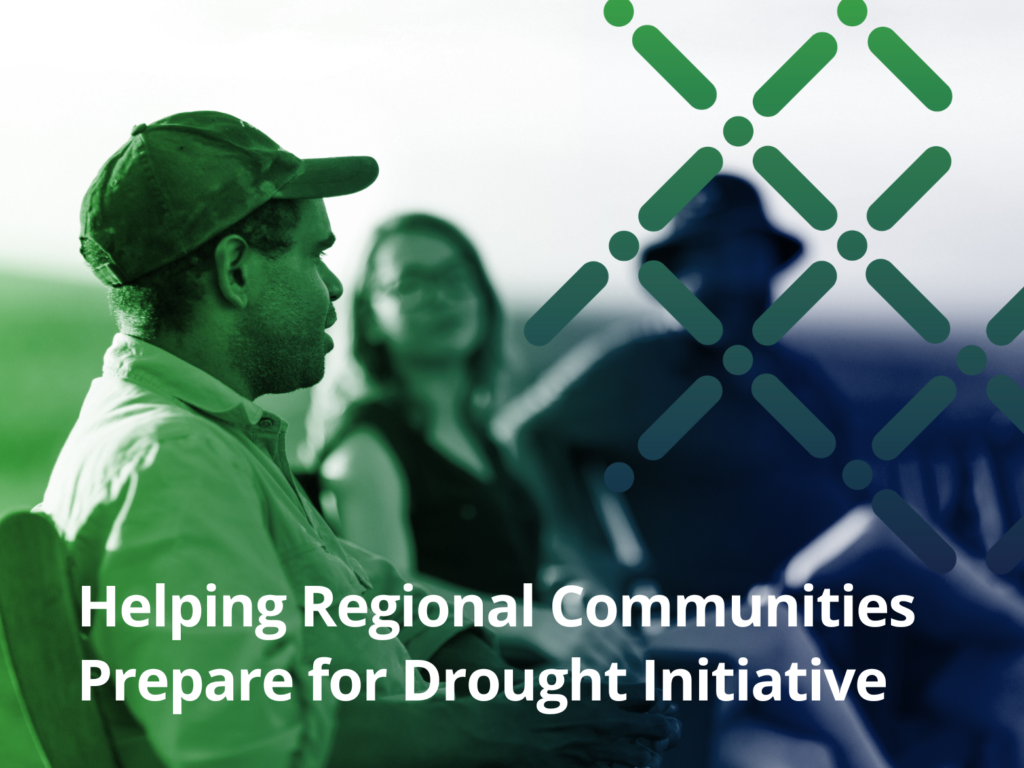
In this final tranche of funding, delivered in partnership with ARLF, grants of nearly $1 million have been awarded to support 15 organisations in delivering 19 projects across the Central West region of NSW, the Eyre Peninsula region of SA and the Loddon Campaspe region of VIC. The grants are designed to enhance drought preparedness through strengthening, enabling and building social capital.
FRRR’s Disaster Resilience and Recovery Lead, Nina O’Brien, says that there are a range of projects being funded in each area, which reflect local priorities.
“All these projects have come about thanks to a robust, locally-led co-design process. In Central NSW, for example, we saw more than 20 organisations, including First Nations groups, actively engage in helping to prioritise what would make a difference in their region.
“The Central West of NSW has been impacted by flooding, as well as bushfires on top of the Black Summer bushfires. These events, combined with prolonged drought conditions have left the community fatigued and in continuous recovery.
“This funding, which will be coordinated by Regional Development Australia – Orana, will support projects including strengthening local leadership and networks through a series of events; a seminar for rural women, which will create a safe space for sharing and creating connections; and educational activities. Other projects in this region will include a pilot program to increase access to better mental health support; a series of networking and social support activities targeting young women; and workshops providing culturally sensitive information in different languages targeting the diverse multicultural community living in the region.
“It’s a similar story in South Australia’s Eyre Peninsula, where the program activity will be coordinated by Agricultural Innovation and Research Eyre Peninsula. The co-design process saw 37 participants from the not-for-profit sector, government, small business and general community invited to have input. Four projects have been supported, again with a series of events and activities focusing on different groups, including rural women, young farmers (through peer-to-peer learning) and the broader community, with a focus on building understanding of drought and drought preparedness at a farm, environment and whole of community level.
“In the Loddon / Campaspe region, in Victoria, there is a history of drought, although in late 2022, the region experienced significant flood damage. Several communities remain displaced with the recovery and rebuilding process hampered by a variety of factors, including volunteer fatigue. Despite this, there was strong engagement in the co-design process, including the local traditional owners, the Dja Dja Wurrung Clans Aboriginal Corporation. Coordinated by LEAD Loddon Murray Inc, there are four projects that will be supported in this region, including redevelopment of the Bridgewater Community Hub to build a community garden and sensory garden, backed up by eight community workshops to share knowledge. There will also be an education program – ‘Let’s Talk About the Weather’ – involving local community mapping of the network and focused capacity building support. The Dja Dja Wurrung Clans will lead a project that will employ a local coordinator who will work with Council, Landcare, community organisations and private landholders to heal Country, building understanding of traditional land management practices and ways to restore the land. The final project will focus on building and strengthening networks and building capacity of individual leaders in climate resilience,” Ms O’Brien explained.
In addition to the projects that are being supported, each region will also engage in a leadership development activity. ARLF Chief Executive, Matt Linnegar, says those activities include either a community leadership program, leadership action initiative, group coaching or change-maker workshops.
“The activities will be tailored to each area and we’re already working with the local community partner lead organisation to work out the best timing for the various activities. Leadership development is a critical part of building the social capital required to strengthen drought resilience. It helps to create and build local networks, as well as develop the skills and knowledge to take action and address challenges and make the most of opportunities.”
Participants also gain access to the wider alumni network of the ARLF. “It’s these connections that prove invaluable to people. When they’re stuck, there’s someone to ask for advice,” Mr Linnegar said.
FRRR is currently inviting applications for small grants to support activity in parts of the country where there was no Community Impact Program grant awarded. Full details are available at www.frrr.org.au/small-networks-grants.
Other elements of the Future Drought Fund’s Helping Regional Communities Prepare for Drought Initiative are also underway, including a Mentoring program and an online network connecting community members involved in projects in each of the regions, both led by ARLF. FRRR has also launched a portal providing access to experts to support delivery of their projects, if local expertise isn’t available.
Community Impact Program grantees have commenced delivering project activity, increasing connection across regions and supporting locally identified and driven drought preparedness activities. Some activities delivered so far are young farmer network events, women’s events and local field day type activities in several regions, with strong local participation and attendance. From FRRR’s perspective, it is exciting to see the momentum being created by passionate locals keen to see their regions remain connected, and vibrant as dry times increase across many communities nationally.
Learn more about the Helping Regional Communities Prepare for Drought Initiative at www.frrr.org.au/drought-preparedness.
The full list of grant recipients and their projects are below.
| Organisation | Project | Location | Grant | |||
|---|---|---|---|---|---|---|
| New South Wales: Region 03 Central West | ||||||
| Regional Development Australia - Orana | Community Partner Lead Organisation (CPLO): Region 03 Strengthen drought preparedness and drive local action in the Central West region through the coordination of Community Impact Program activities and evaluation administration. | Central West NSW Region | $49,608 | |||
| Coonamble Chamber of Commerce Incorporated | Wellbeing Changemaker Assistance Program Support members of the Coonamble Chamber of Commerce (80+ members) and their families to face drought and other stresses through the provision of access to mental health support services as community workshops and the provision of space locally for mental health support services in Coonamble. | Coonamble Shire | $85,465 | |||
| Hovells Creek Landcare Group Incorporated | Building Community Networks, Community Support and Resilience to Drought Through Social and Learning Activities Increase awareness of and change attitudes to drought preparedness through the delivery of two community workshops focused on holistic property management during drought. | Cowra, Weddin, Hilltops, Hovells Creek, Wyangala | $14,700 | |||
| Oriscon Incorporated | Creating Connections Project Stimulate a change in awareness of and change attitudes towards drought preparedness at the community level through the development of a multilingual knowledge and information sharing website, two community workshops and a networking event supporting migrant community members in connecting, accessing, and understanding localised climate adaptation and drought preparedness activities and information across Central Western NSW. | Dubbo, Warren, Gilgandra, Wellington, Nyngan, Narromine, Wellington, Stuart Town | $10,000 | |||
| Tradies IN Sight | NSW Real Reconnections Tour Build local networks and social support mechanisms required to better prepare for drought through the provision of eight informal mental health events focused on connecting regional men. | Dubbo, Narromine, Gilgandra, Coonabarabran, Warren, Nyngan, Cobar, Tattenham, Parkes, Bourke, Brewarrina, Walgett | $18,417 | |||
| Voices of Women Incorporated | EMBRACE: Voices of Women Dubbo Build a shared experience that can be drawn upon for support during drought through local networks and social support for young women aged 18-35 through the delivery of an intensive creative workshop focused on building relationships and confidence of young women. | Dubbo | $9,550 | |||
| Watershed Landcare Group Incorporated | Empowering Watershed Women Stimulate a change in awareness of and attitudes towards drought preparedness through the delivery of a seminar for rural women focused on providing a safe space for communication, support, mentoring, professional development and empowerment. | Mudgee, Cudgegong | $10,000 | |||
| Watershed Landcare Group Incorporated | Holistically Strengthening the Capabilities and Resilience of our Rural Community Enable the community to build their local leadership, networks and social support mechanisms at a community level through the delivery of three connection and networking events and Holistic Management training focused on a comprehensive drought and disaster resilience approach to agricultural practices and decision-making. | Mudgee, Gulgong, Rylstone, Kandos | $40,700 | |||
| Western Rural Connect Inc. | Western Rural Connect Networking and Development Events Build local leadership, networks and social support to build drought and other disaster resilience through the delivery of three Women in Agriculture events over two years. | Narromine | $18,000 | |||
| South Australia: Region 23 Eyre Peninsula | ||||||
| Agricultural Innovation & Research Eyre Peninsula Incorporated | Community Partner Lead Organisation (CPLO): Region 23 Strengthen drought preparedness and drive local action in the Eyre Peninsula region through the coordination of Community Impact Program activities and evaluation administration. | Eyre Peninsula SA Region | $30,760 | |||
| Agricultural Innovation & Research Eyre Peninsula Incorporated | Young Farmer – Facilitated Peer to Peer Learning Share innovative ways to build drought resilience and build local leadership, networks and social support in Ceduna and Cleve locations. AIR EP will offer four field events for young farmers focusing on young people aged 18-35 years. | Ceduna and Cleve | $60,000 | |||
| District Council Of Cleve | Future Farmers Focus Future Farmers support a change in awareness of and attitudes to drought preparedness at the community level through the delivery of learning workshops for two target audiences: 1. high school students; 2. families, industry and broader community. | Cleve | $47,000 | |||
| WoTL Ltd | Better Connected Communities Engage 12-15 young women in remote and highly drought sensitive communities to participate in a series of workshops covering a range of topics with overt social drought preparedness themes and outcomes. | Cleve, Franklin Harbour | $77,456 | |||
| WoTL Ltd | Regenerate Rural Women Learn and share innovative ways to build drought resilience by engaging approximately 15 local women in a comprehensive program covering topics to build personal resilience, refine decision making skills, clarify priorities and goals, and enhance personal, family and community wellbeing in Ceduna and Lower Eyre Peninsula. | Lower Eyre Peninsula, Ceduna | $68,400 | |||
| Victoria: Region 28 Loddon Campaspe | ||||||
| Lead Loddon Murray Inc | Community Partner Lead Organisation (CPLO): Region 28 Strengthen drought preparedness and drive local action in the Loddon Campaspe region through the coordination of Community Impact Program activities and evaluation administration. | Loddon Campaspe VIC region | $80,000 | |||
| Lead Loddon Murray Inc | 2024 Loddon Murray Community Leadership Program - Climate Resilience Enable an increase in the reach and activities of community leaders, mentors, networks and organisations driving action on drought resilience through the delivery of LMCLP Climate Resilience program. | Loddon Campaspe VIC Region | $80,000 | |||
| Kooyoora Women's Network Inc | Bridgewater Railway Station Redevelopment Build depth of social connection and increase skills, knowledge and understanding of the risks posed by drought and climate change while offering a place for community connection through the further development of the Bridgewater Community Hub. | Bridgewater, Loddon Shire | $75,000 | |||
| Dja Dja Wurrung Clans Aboriginal Corporation | Healing Country across Djandak Stimulate a change in awareness of and attitudes to drought preparedness while increasing engagement with and participation of First Nations community members through the delivery of the Djaara Forest Gardening Engagement Coordinator pilot program, “Healing Country on Djandak”. | Campaspe, Loddon, Central Goldfield, Bendigo | $100,000 | |||
| Jumpleads NFP Limited | Let's Talk About the Weather | Drought Resilience Enable communities to identify and adopt innovative ways to build drought preparedness at the community level through the delivery of a Let’s Talk About the Weather program across Campaspe, Loddon and Central Goldfields local government areas. | Campaspe, Loddon, Central Goldfields | $120,000 | |||
56 projects funded thanks to the Future Drought Fund
FRRR has awarded $3.65 million in grants to 11 agriculture-dependent regions across Australia, for projects that will better prepare their communities for the impacts of drought and a changing climate.

The $3,654,124 in grants is funded through the Australian Government’s Future Drought Fund, and delivered as part of the Helping Regional Communities Prepare for Drought Initiative’s Community Impact Program. To date, $9,115,583 in grants has been awarded to 27 agriculture-dependent regions, through the Program.
Delivered in partnership with ARLF, the Program aims to strengthen the ability of agriculture-dependent communities to work together to prepare for future drought or other disaster.
Nina O’Brien, Disaster Resilience and Recovery Lead for FRRR, said that the collaborative nature of the Community Impact Program means locals in each region have come together to identify and act on their communities’ drought preparedness priorities, at a grassroots level.
“The beauty of this program is that it’s so flexible. It can support events, initiatives, training and even small-scale infrastructure. But at their core, each project is about fostering the growth of stronger networks to encourage shared learning and more collaboration. We’re already seeing that happen among the program facilitators, who are leading by example, having established a community of practice, and mentoring one another across the regions.
“We recognise that co-design in each region has taken significant effort and we particularly thank the Community Partner Lead Organisations for stepping up and taking the lead in bringing everyone together. It’s been wonderful to be able to harness local knowledge and expertise and to have a cross-section of the community collaborate and create solutions. We know that these projects will strengthen the networks, support, engagement and wellbeing of people across their region.
“We look forward to seeing the continued growth of these networks and to seeing the impacts of these projects as they roll out over the next two years,” Ms O’Brien said.
Funded projects include a youth community hub and film festival on Mitakoodi Country, Cloncurry in Queensland. The Mitakoodi Community and Housing Aboriginal Corporation will use a $76,809 grant to develop the hub and festival, which will build a depth of social connection, a shared sense of purpose, and longer-term community belonging that locals can draw upon in future drought.
In Boyup Brook, Western Australia, Blackwood Basin Group Incorporated has been awarded a $40,730 grant to run a series of land management workshops, as well as produce written resources and provide accidental counselling. These capacity building activities will provide local people and communities with opportunities to develop the skills and knowledge to face the unique challenges caused by drought.
As part of the program, each region will also access tailored leadership development activities, delivered by ARLF.
ARLF Chief Executive, Matt Linnegar, says the leadership development supports the delivery of local projects and yields long-term benefits for the regions.
“We know that a multimodal approach of leadership development increases the impact the investments have in each region. In addition to the project funding, these leadership development activities build social capital required to support the project and people in each region. We get to connect local networks, create a deeper sense of shared purpose and develop capability that helps people to take action and address challenges and make the most of opportunities.”
Participants also gain access to the wider alumni network of the ARLF. “It’s these connections that prove invaluable to people. When they’re stuck, there’s someone to ask for advice,” Mr Linnegar said.
Other elements of the Future Drought Fund’s Helping Regional Communities Prepare for Drought Initiative are also underway, including a Mentoring program and an online network connecting community members involved in projects in each of the regions, both led by ARLF.
FRRR has also launched a portal providing access to experts to support delivery of their projects, if local expertise isn’t available. A small grants funding round will also open before the end of the year to support projects in areas not covered by the Community Impact Program.
Learn more about the Helping Regional Communities Prepare for Drought Initiative at www.frrr.org.au/drought-preparedness.
The full list of grant recipients and their projects are below.
| Organisation | Project | Location | Grant | |||
|---|---|---|---|---|---|---|
| New South Wales: Region 05 Northern Tablelands | ||||||
| Glenrac Incorporated | Community Partner Lead Organisation (CPLO): Region 05 Strengthen drought preparedness and drive local action in the Northern Tablelands region through the coordination of Community Impact Program activities and evaluation administration. | Northern Tablelands NSW Region | $30,146 | |||
| Glenrac Incorporated | Growing Social Capital, Glen Innes Enhance awareness of and attitude toward drought preparedness and build local leadership, networks and social support through a diverse series of community events, activities and delivery partners. | Glen Innes | $70,508 | |||
| Gwymac Incorporated | Connecting our Community for Resilience in Tough Times Enhance awareness of and attitudes toward drought preparedness through building local leadership, networks and social support through a series of collaborative events. | Inverell | $51,290 | |||
| Southern New England Landcare Ltd | SNEL HELP – Preparing Communities for Drought Increase the reach and activities of community leaders, mentors, networks and organisations driving action on drought resilience through the delivery of a series of community activities and events that will share information on the local impacts of drought, drought preparation activities and strengthen local connections, networks and relationships. | Armidale, Inverell, Uralla and Walcha | $62,214 | |||
| Granite Borders Landcare Committee Incorporated | Drought Community Impact Program Enable communities to identify and adopt innovative and transformative ways to build drought resilience through a series of collaborative workshops targeting innovation in drought preparation information and knowledge sharing. | Tenterfield | $70,936 | |||
| Queensland: Region 07 South-West | ||||||
| Southern Queensland Natural Resources Management Ltd | Community Partner Lead Organisation (CPLO): Region 07 Strengthen drought preparedness and drive local action in the South-West region through the coordination of Community Impact Program activities and evaluation administration. | South-West QLD Region | $20,500 | |||
| Thallon Progress Association Inc | PODDS 4 Thallon & Bollon (Place of Diversity & Development) Increase the reach and activities of community leaders, mentors, networks and organisations driving action on drought resilience through the development of shared workspaces in Thallon and Bollon. | Thallon and Bollon, Balonne Shire | $126,800 | |||
| Wyandra and District Progress and Recreation Association Inc | Wyandra & Surrounds Drought Resilience Leadership Network – Empower Paroo & Murweh Increase the reach and activities of community leaders, mentors, networks and organisations driving action on drought resilience across Paroo and Murweh through the delivery of community events, minor community infrastructure upgrades, leadership network establishment and connection to local support services. | Wyandra, Cunnamulla, Charleville | $83,615 | |||
| Queensland: Region 10 North-West | ||||||
| Southern Gulf NRM Ltd | Community Partner Lead Organisation (CPLO): Region 10 Strengthen drought preparedness and drive local action in the North-West region through the coordination of Community Impact Program activities and evaluation administration. | Queensland North-West Region | $33,007 | |||
| Southern Gulf NRM Ltd | Proactively Improving Mental Health Preparedness in Northwest QLD Enable capacity building activities where local people and communities have opportunities to develop the skills and knowledge to face the unique challenges caused by drought through the delivery of mental health first aid training across the region. | Cloncurry, Julia Creek, Richmond, Hughenden, Normanton, Burketown, Mount Isa | $66,209 | |||
| Southern Gulf NRM Ltd | Community Group Development Facilitator for Northwest QLD Improve capability, coordination and collaboration between networks, other community organisations and sectors that can be drawn upon in future drought through delivery of governance, volunteer management, communications and project management training. | Mount Isa, Cloncurry, McKinlay, Richmond, Flinders, Burke, Carpentaria | $148,538 | |||
| Mitakoodi Community and Housing Aboriginal Corporation | The Cloncurry Community Hub and Film Festival Build a depth of social connection, a shared sense of purpose and longer-term community belonging that can be drawn upon in future drought through the development of a youth community hub and film festival. | Mitakoodi Country,Cloncurry | $76,809 | |||
| Western Australia: Region 21 South-West | ||||||
| South West Catchments Council | Community Partner Lead Organisation (CPLO): Region 21 Strengthen drought preparedness and drive local action in the South-West region through the coordination of Community Impact Program activities and evaluation administration. | WA South-West Region | $23,768 | |||
| Warren Catchments Council | Green Spaces Counter the Blues Enable capacity building activities where local people and communities have opportunities to develop the skills and knowledge to face the unique challenges caused by drought through a coordinated series of water efficient landscaping / gardening workshops. | Shire of Manjimup | $75,661 | |||
| Southern Forest Arts Inc | Rivers of Thirst Build depth of social connection, awareness of and constructive attitudes to drought preparedness at the community level through community development of seven public artworks across towns in the region. | Manjimup, Boyup Brook, Nannup, Bridgetown-Greenbushes | $49,908 | |||
| South West Catchments Council | Community Resilience Network Improve the capability, coordination and collaboration between networks, other community organisations and sectors that can be drawn upon in future drought through the establishment of a Community Resilience Network of local groups in Community Resource Centres. | Manjimup, Boyup Brook, Bridgetown-Greenbushes, Donnybrook-Balingup, Augusta- Margaret River, Harvey, Dardanup, Busselton | $86,935 | |||
| Blackwood Basin Group Incorporated | Boyup Brook Community Drought Preparedness Enable capacity building activities where local people and communities have opportunities to develop the skills and knowledge to face the unique challenges caused by drought, through a series of land management workshops, production of written resources and accidental counselling training. | Boyup Brook | $40,730 | |||
| Goomburrup Aboriginal Corporation | Ni! Boodja Waangkiny (Noongar Seasonal Calendar) Enable depth of social and cultural connection, awareness of and constructive attitudes to drought preparedness at the community level through the development of a place-based, locally developed Noongar seasonal calendar that captures the knowledge and resilience of the people and culture with storytelling. | Bunbury | $66,000 | |||
| South Australia: Region 24 Northern and Yorke | ||||||
| Regional Development Australia Barossa Gawler Light Adelaide Plains Incorporated | Community Partner Lead Organisation (CPLO): Region 24 Strengthen drought preparedness and drive local action in the Northern and Yorke region through the coordination of Community Impact Program activities and evaluation administration. | SA Northern and Yorke Region | $56,893 | |||
| Lochiel Progress Association | Diner en Rose Build depth of social connection, a shared sense of purpose, and longer-term community belonging that can be drawn upon in future drought through a community event celebrating the local landscape. | Lochiel– Pink Lake (Wakefield Regional Council) | $21,170 | |||
| Wirraminna Care | Scone / Coffee Times Bringing Neighbourhoods Together to Share Socially Build depth of social connection, a shared sense of purpose and longer-term community belonging that can be drawn upon in future drought by addressing social isolation within the community. | Williamstown, Eden Valley | $7,000 | |||
| WoTL Ltd | Managing Yourself and Your Business Through Drought and Other Disruption Enable capacity building activities where local people and communities have opportunities to develop the skills and knowledge to face the unique challenges caused by drought through leadership workshops specifically designed for women. | Riverton, Clare, Kadina | $67,000 | |||
| Two Wells Regional Action Team | Drought Resilient Greening for Community Wellbeing Enable a change in awareness of and attitudes to drought preparedness at the community level and enhance the public good by planting drought-tolerant trees at three entrances to the township of Two Wells. | Two Wells | $3,000 | |||
| Barossa Improved Grazing Group Incorporated | Building Local Human Capacity to Support Drought Preparedness Across the Barossa Generations and Community Enable capacity building activities where local people and communities have opportunities to develop the skills and knowledge to face the unique challenges caused by drought through supporting and training young farmers. | Barossa, Light, Mid Murray | $55,000 | |||
| Victoria: Region 27 Mallee | ||||||
| Mallee Sustainable Farming Inc | Community Partner Lead Organisation (CPLO): Region 27 Strengthen drought preparedness and drive local action in the Mallee region through the coordination of Community Impact Program activities and evaluation administration. | VIC Mallee Region | $76,818 | |||
| First People of the Millewa-Mallee Aboriginal Corporation | Community Impact Program – Mallee Region Build depth of social connection and increase skills, knowledge and understanding of the risks posed by drought and climate change through land management training and mentorship of young First Nations people. | Neds Corner Station, Mildura | $41,200 | |||
| Birchip Cropping Group Inc | Mallee BCG Young Farmer Network Enable capacity building activities where young farmers have opportunities to develop the skills and knowledge to face the unique challenges caused by drought in remote, rural, and regional Australia through the growth of a Young Farmers Network. | Quambatook, Birchip, Manangatang | $32,960 | |||
| Mallee Sustainable Farming Inc | The Mallee Matters Build awareness of and changed attitudes to drought preparedness at the community level through the production of short videos that showcase local resilience. | Northern Mallee areas | $65,920 | |||
| Food Next Door Cooperative | Food Next Door Co-op: Sustainable CALD Market Gardening Build the capacity of local people and communities to develop the skills and knowledge to face the unique challenges caused by drought in remote, rural and regional Australia through irrigation management training for CALD communities. | Mildura, Merbein, Nichols Point and Red Cliffs | $56,856 | |||
| Rural Business and Community Limited | Shared Shop Increase economic diversification in an agriculture-dependent community through the establishment of a cooperative ‘shared shop’ for micro businesses in Donald. | Donald | $32,960 | |||
| Rural Financial Counselling Service Victoria Wimmera South West Inc | Resilient Small Businesses Deliver capacity building activities where local people and communities have opportunities to develop the skills and knowledge to face the unique challenges caused by drought in remote, rural and regional Australia through the establishment of a small business resilience network targeted at new, young and Indigenous business owners. | Mildura | $41,200 | |||
| Millewa Advisory Group | Millewa SHIM Shed Build depth of social connection, a shared sense of purpose, and longer-term community belonging that can be drawn upon in future droughts through the establishment of a community gathering space in the Millewa district. | Millewa | $17,304 | |||
| Victoria: Region 29 Wimmera Southern Mallee | ||||||
| Wimmera Southern Mallee Development Limited | Community Partner Lead Organisation (CPLO): Region 29 Strengthen drought preparedness and drive local action in the Wimmera Southern Mallee region through the coordination of Community Impact Program activities and evaluation administration. | VIC Wimmera Southern Mallee Region | $44,228 | |||
| Wimmera Southern Mallee Development Limited | Community Connector Program Improve the capability, coordination and collaboration between networks, other community organisations and sectors through service mapping, gap analysis, resource development and network capability building and service promotion before the next drought hits. | Whole of WSM | $133,700 | |||
| Wimmera Southern Mallee Development Limited (Migrant Settlement Services) | Migrant Youth Support Build depth of social connection, shared cross cultural drought knowledge and longer-term community belonging that can be drawn upon in future drought through a drought resilience building program for young migrants. | Horsham, Nhill | $50,000 | |||
| Wimmera Catchment Authority | Ranch Billabong Build depth of social connection, a shared sense of purpose and longer-term community belonging through the revitalisation, and increased visitation of a culturally significant site by the local First Nations and wider community. | Barengi Gadjin Land Council | $40,000 | |||
| West Vic Business Incorporated | Community Placemaking Build depth of social connection, a shared sense of purpose and longer-term community belonging that can be drawn upon in future drought through capacity building activities where local people and communities have opportunities to develop the skills and knowledge to face the unique challenges caused by drought through the establishment of a Place-making network. | VIC Wimmera Southern Mallee Region | $46,393 | |||
| Victoria: Region 32 West Gippsland | ||||||
| Food & Fibre Gippsland Inc | Community Partner Lead Organisation (CPLO): Region 32 Strengthen drought preparedness and drive local action in the West Gippsland region through the coordination of Community Impact Program activities and evaluation administration. | VIC West Gippsland Region | $96,050 | |||
| Rural Financial Counselling Service Victoria - Gippsland Inc | Backbone Build awareness of and attitudes to drought preparedness at the community level by producing two drought resilience special editions of the Rural and Regional Backbone magazine. | Latrobe Valley, South Gippsland, Wellington, Bass Coast | $99,880 | |||
| Food & Fibre Gippsland Inc | Gated Framework – Community Build capability in community leaders, networks and organisations to undertake strategic drought resilience planning and future drought preparedness activities through the development of a templated drought preparedness framework. | Baw Baw, Latrobe Valley, South Gippsland, Wellington, Bass Coast | $109,978 | |||
| Gippsland Women's Health Inc | Gendered Violence Prevention – Active Bystander Training Develop skills, knowledge and capacity to face the unique challenges caused by drought through Active Bystander (Family Violence) training. | Baw Baw, Latrobe Valley, South Gippsland, Wellington, Bass Coast | $44,122 | |||
| Rural Financial Counselling Service Victoria - Gippsland Inc | ADAPT Increase the reach and activities of community leaders, mentors, networks and organisations driving action on drought resilience by subsidising the delivery of ADAPT wellness program including online training and ongoing mentoring supporting small to medium sized grassroots organisations to access informal wellness support mechanisms at a community level. | Baw Baw, Latrobe Valley, South Gippsland, Wellington, Bass Coast | $35,000 | |||
| Victoria: Region 33 Ovens Murray | ||||||
| AgBiz Assist Limited | Community Partner Lead Organisation (CPLO): Region 33 Strengthen drought preparedness and drive local action in the Ovens Murray region through the coordination of Community Impact Program activities and evaluation administration. | VIC Ovens Murray Region | $30,000 | |||
| Alpine Valleys Community Leadership Fund Ltd | Community Capacity Building Support capacity building activities where local people and communities have opportunities to develop the skills and knowledge to face the unique challenges caused by drought through a community leadership program. | Indigo Shire | $95,000 | |||
| Startup Shakeup Ltd | Digital Work Skills Build capacity of local people and communities to develop the skills and knowledge to face the unique challenges caused by drought through business digital skills training. | Indigo Shire and City of Wangaratta | $95,000 | |||
| AgBiz Assist Limited | Wellbeing and Social Connection Build capacity of local people and communities to develop the skills and knowledge to face the unique challenges caused by drought through mental health awareness and support activities and training. | Indigo Shire and City of Wangaratta | $170,328 | |||
| Tasmania: Region 34 North and North West | ||||||
| Rural Business Tasmania Inc | Community Partner Lead Organisation (CPLO): Region 34 Strengthen drought preparedness and drive local action in the North and North West region through the coordination of Community Impact Program activities and evaluation administration. | TAS North and North west Region | $47,000 | |||
| Southern Farming Systems Ltd | Empowering Rural Youth to Build Capacity in Tasmanian Rural Communities Build depth of social connection and increase skills, knowledge and understanding of the risks posed by drought and climate change through tailored drought related events for three distinctive climates in the region. | Scottsdale, Ulverstone, Campbell Town | $102,000 | |||
| Rural Business Tasmania Inc | Local Communities Volunteer Project Build depth of social connection, a shared sense of purpose and long-term community belonging that can be drawn upon in future drought by connecting volunteer-based community organisations with young people in the region. | Fingal, Deloraine, Scottsdale, Whitemark | $114,084 | |||
| Tasmanian Leaders | Drought Resilient Impact Preparedness (DRIP) Build capacity of local people and communities to develop the skills and knowledge to face the unique challenges caused by drought through a targeted leadership program. | TAS North and North West Region | $99,709 | |||
| RANT Arts | Close Up: Drought Preparedness Build awareness of and attitudes to drought preparedness at the community level through the creation of accessible educational videos. | Devonport, Burnie, Latrobe, Meander Valley | $31,059 | |||
| Tasmania: Region 35 South Region | ||||||
| University of Tasmania | Community Partner Lead Organisation (CPLO): Region 35 Strengthen drought preparedness and drive local action in the South region through the coordination of Community Impact Program activities and evaluation administration. | TAS South Region | $38,778 | |||
| Rural Business Tasmania Inc | Local Community Volunteer Project Build a depth of social connection, a shared sense of purpose and longer-term community belonging that can be drawn upon in future drought by connecting volunteer-based community organisations with young people in the region. | TAS South Region | $100,000 | |||
| Southern Regional Natural Resource Management Association | Igniting Community Build culturally informed drought preparedness and social connection through a shared sense of purpose, which can be drawn upon in future drought through a series of cultural burn workshops. | Southern Tasmania | $100,000 | |||
| Reconciliation Council of Tasmania Limited | Youth Mob Build depth of social connection, awareness of and attitudes to drought preparedness at the community level by developing land management skills of young First Nations people. | Clarence and Sorell Municipality | $82,960 | |||
| Tasmanian Small Business Council Inc | Tasmania Small Business Community Resilience Project Build the capacity of local people and small business to develop the skills and knowledge to face the unique challenges caused by drought through a series of business workshops and field trips. | Dunalley, Triabunna, Swansea | $90,000 | |||
The far northern tip of Queensland – Gulf country – extends from wide plains through to tropical rainforest, but mostly comprises dry tropical savannah country. It s a very isolated region, yet is a productive beef grazing area, with some areas of horticulture. About 10,000 people live in 234,000 square kilometres – an area the equivalent size of Victoria. About 25% of people in the Gulf region identify as Indigenous.
Gulf Savannah Natural Resource Management (GSNRM) connects science, technology and landcare to improve productivity for farmers and graziers. Drought is a common challenge, with frequent extended dry seasons recorded over the last 30 years. GSNRM saw an opportunity to bring together producers for a series of forums across the region to strengthen networks and generally build the community’s capacity to better respond to the impacts of drought. They were supported by a Future Drought Fund Networks to Build Drought Resilience grant of $49,700.
To make the most of the time, organisers planned a farm visit during the Farming Forum, followed by information sessions and a lunch. With most graziers travelling long distances, their session was over two days, providing an opportunity for participants to not only gain new knowledge and skills but also reinforce and strengthen connections between these very isolated residents at social events. The face-to-face events provided a mix of guest speakers to impart knowledge and practical implementation skills or planning sessions to start putting the ideas into action. This included building
understanding of the risks posed by drought by exposing participants to discussions about the future of the region in the face of adverse climatic conditions and then discussing potential solutions. This approach empowered community members to make business resilience changes and fostered partnerships and collaboration between growers, graziers, agronomists, extension officers, industry, drought hub and government.
The organisers also recognised that, by far, the greatest risk posed by drought and the unpredictable nature of climate change is deteriorating mental health. The Unbreakable Success Matrix program, which involved online learning supported by live group discussions and mentoring, gave people the tools to mentally cope with those elements of their lives that cannot be controlled. This structure enabled geographically diverse individuals to come together over several weeks and develop an understanding of how others are coping or not coping, and receive the benefits of listening to the coaching and ideas from the facilitators.
Regular touch points enabled people to get to know each other better and therefore, as the program progressed, saw more vulnerable sharing and thus greater problem solving within the group. Assessment showed the ‘fear factor’ had significantly reduced for all respondents.
These events had the support of the Gulf Cattlemen’s Association and the FNQ Growers Association and were promoted widely through a range of different databases. This ensured a diverse cross-section of the community participated, beyond those that GSNRM normally engages with.
In total, 106 people participated in the three events, ranging from 15 to 74 years, although around 80% were aged 45-64. Around 15% were 15-24. Participants were often intergenerational and reflected a mix of new and established residents and was reflective of the general community.
The opportunity to contemplate drought and climate change in a supportive atmosphere and consider how prepared they are, or not, saw 42% of respondents say that the forums had ‘definitely prompted‘ them to change something in their business, while another 25% said they were ‘somewhat prompted’. Almost 100% of all respondents said that each speaker session was either ‘very valuable‘ or ’valuable’. For the GSNRM group itself, their network has increased dramatically and it has also seen significant increases in the interconnections between virtually all aspects of the
industry, especially across sectors.
It has been over 20 years since the rural town of Marama has had an active committee. In past generations of the committee, Marama Community Incorporated has been extremely social, connected and dedicated to keeping the town together. The main purpose of the committee was to bring people and community together with sport, dances, weddings, social events and church services. All of these events were usually held at the community-owned hall.
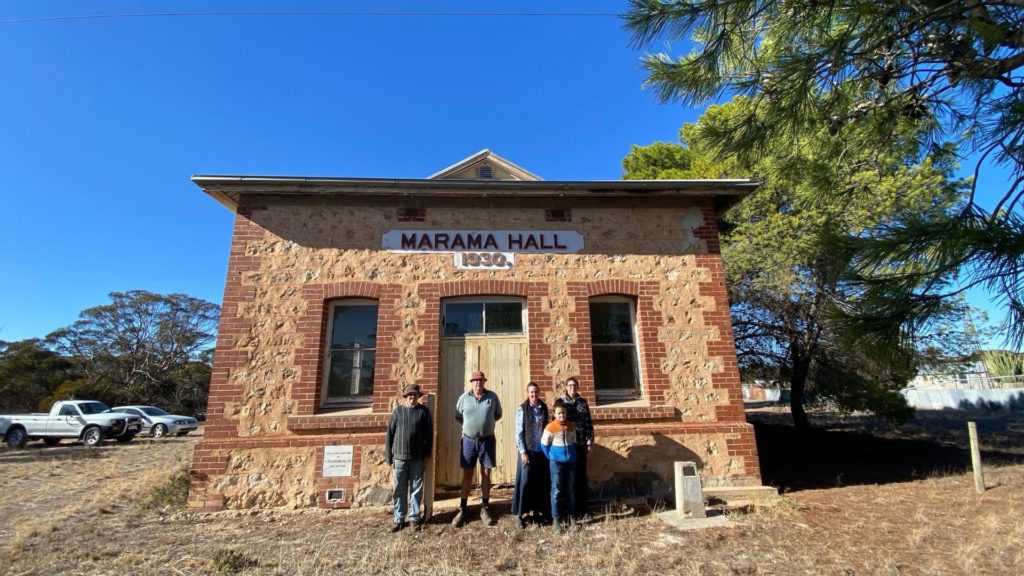
Now with a newly elected committee, the current generation was keen to foster a sense of belonging by renewing and improving the hall and providing a central place for activities to be held once again, however the space had fallen into disrepair after years of no use.
During the time the new committee was being elected, the district was also experiencing severe drought. A lot of the local farming community were feeling the effects on their mental health from prolonged drought. This added another layer of importance to the renewal of the hall; the community needed somewhere to come together and support one another.
With a $150,000 grant from the Australian Government’s Future Drought Fund’s Networks to Build Drought Resilience the committee was able to fund the underpinning, roof replacement, ceiling replacement, stone work, paint the interior, electrical work (including air-conditioning), and new toilet facilities.
The project relied on a big commitment from the community to get involved through volunteer work, local contractors and working bees to get the job done. But there was never any doubt they wouldn’t pull through!
Since completing the renovations on the hall the community has seen a dramatic shift in the attitudes of residents. Not only did the project give them a reason to meet throughout construction, but they now have a shared space to use that they can be proud of.
“Overall, the finished project is something we as a community are very proud of, and it has helped bring us together to work as a team to achieve a better, more user-friendly outcome.”
The hall has been host to a number of important community events since its completion and is booked in to host future events held by key industry groups that will benefit the community by improving abilities to adapt, reorganise or transform in response to a changing climate, increasing variability and scarcity of rainfall and changed seasonality of rainfall.
The Foundation for Rural & Regional Renewal (FRRR) and the Australian Rural Leadership Foundation (ARLF) have today announced the appointment of Nous Group to assess the impact of the Future Drought Fund’s Helping Regional Communities Prepare for Drought Initiative, which is funded by the Australian Government.
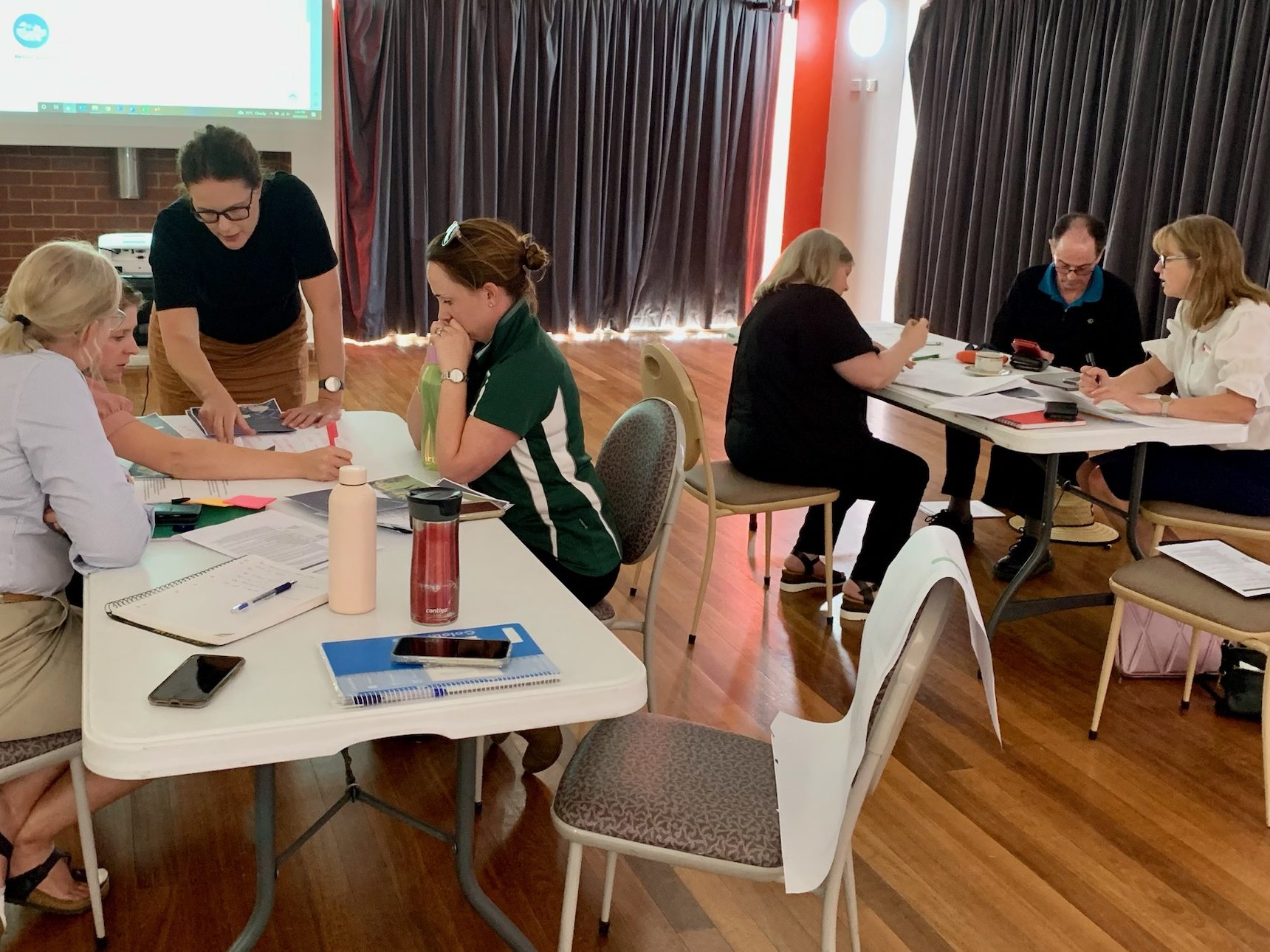
The Future Drought Fund’s Helping Regional Communities Prepare for Drought Initiative aims to build enduring resilience to the impacts of climate change and drought and to enhance the public good in agriculture-dependent communities. It focuses on building community capacity by strengthening social and community networking, support, engagement and wellbeing.
There are five parts to the Initiative, including the Community Impact Program, Small Grants, a Learning Network, Mentoring Program and Expertise Pool to support local groups implementing their projects, all of which will be evaluated.
While the evaluation will explore the outcomes of the Initiative, it will also provide valuable feedback on the various funding mechanisms employed and the impact of leadership development initiatives delivered. This will also reveal insights into the different ways that the Australian Government can invest in remote, rural and regional communities to address locally prioritised challenges. In total, $1.3 million will be invested in the process, reflecting the value that FRRR, ARLF and the Australian Government place on evaluation, something that is often not prioritised or funded.
Multi-year evaluation
The evaluation will take place over two and a half years and see Nous Group consult with the delivery partners, as well as other stakeholders, to develop the evaluation plan and then work closely with local leaders and with the delivery partners on the evaluation itself.
Phase 1 data collection and analysis is already underway, as the first tranche of funding has been awarded. An interim report will be prepared mid-2024, followed by workshops for community groups and stakeholders to unpack the learnings to date. Phase 2 of data collection will then get underway in August 2024, with the final report due September 2025.
FRRR’s Disaster Resilience and Recovery Lead, Nina O’Brien, says that there are great efficiency gains in having Nous Group undertake this work, as they are familiar with both the Future Drought Fund and with the delivery partners. “Nous Group supported the Department of Agriculture, Fisheries and Forestry (DAFF) to design the Measuring, Learning and Evaluation (MEL) framework for the overall Future Drought Fund, so they are intimately familiar with the overall aims of the various streams of work the Fund supports. They bring a depth of understanding and rigour to the process, while still being able to work closely with and relate to the groups delivering projects on the ground.
“What we are most excited about however, is that this process will help build the capacity of communities and stakeholders to engage with and ultimately undertake more formal evaluations of the projects and initiatives that they run. They can learn by doing. These skills will help local communities then better direct their limited resources, as well as be able to provide greater evidence to support funding applications for their initiatives.
“We look forward to working with Nous Group to co-design the evaluation approach and collect insights for the evaluation. We will also be connecting them directly with the local lead partner and other groups delivering projects in the community to understand the impact of the various elements of the Initiative, as well as bring together community groups and stakeholders to explore and interpret their findings,” Ms O’Brien said.
Matt Linnegar, CEO of the ARLF, says understanding the impact is becoming more important for people participating in initiatives, as well as those providing the support for it to happen.
“It’s increasingly important to understand the impact of initiatives like the Helping Regional Communities Prepare for Drought Initiative at depth and from multiple perspectives.
“This is because when we’re talking about leadership across regions and communities, we’re talking about people, relationships, networks and structures. Here, understanding the quantitative impact or intervention on the participant alone isn’t enough.
“It’s important to understand the individual and collective impact those people have on their regions and communities.
“As the ARLF continues to grow its work in the impact evaluation space, we highly value the collaboration with FRRR and work with Nous as an evaluation partner for this Initiative.”
Carlos Blanco, Nous Group Director, says Nous is excited to partner with the FRRR, ARLF and DAFF to collaborate with delivery partners, initiative participants and communities to help build even greater resilience within drought-prone communities.
“Nous has a long history of working with regional communities across Australia. We’re looking forward to co-designing and delivering an evaluation that strengthens the evidence base on how to empower remote, rural, and regional Australia to become more prepared for and resilient to the impacts of drought,” Mr Blanco said.
If community groups have any questions about the evaluation process, they can contact FRRR via futuredrought@frrr.org.au.
More than $1.7M awarded thanks to Future Drought Fund
FRRR and ARLF are pleased to announce the first organisations to receive funding through the Future Drought Fund’s Helping Regional Communities Prepare for Drought Initiative.
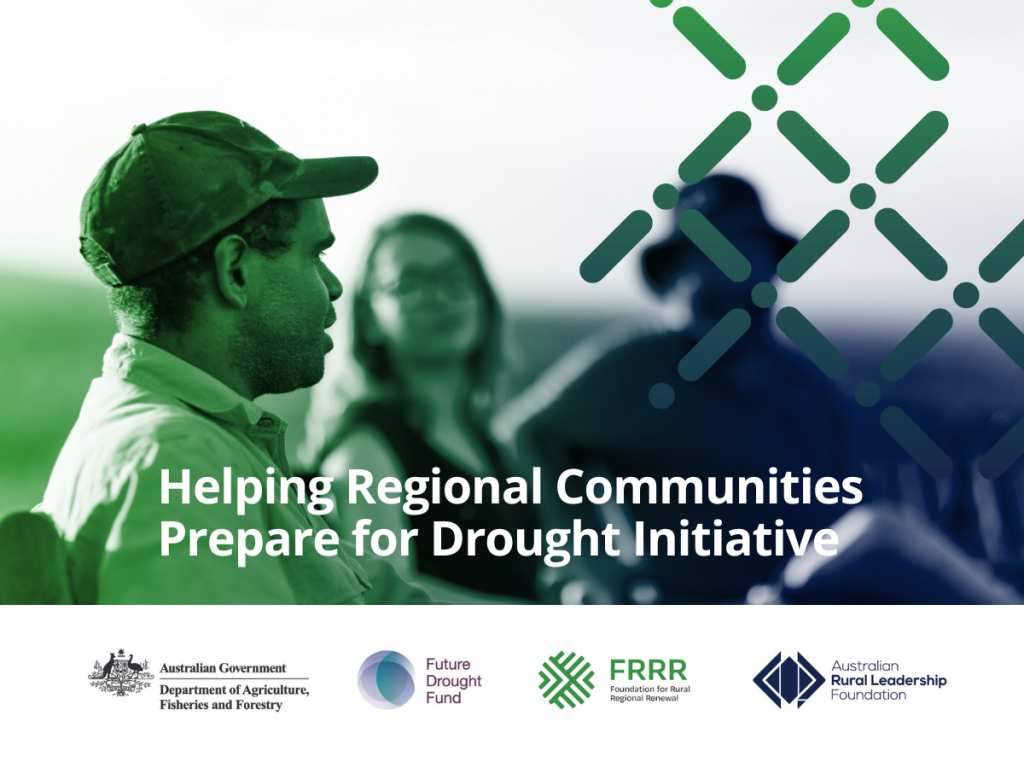
The Initiative, which is being delivered by FRRR in partnership with ARLF, seeks to help agriculture-dependent communities in regions across remote, rural, and regional Australia that are vulnerable to the impacts of drought become more prepared for and resilient to these impacts.
Over the last three months, FRRR and ARLF have worked closely with a local community partner lead organisation in five areas to identify projects that local groups across each region can implement to enhance preparedness for drought.
This first tranche of funding through the Community Impact Program sees five regions awarded $1.7M, which is being shared across 15 organisations.
In the coming months, the local community partner lead organisation will collaborate with other grantee organisations in the region to deliver projects that include events, training and workshops that will create opportunities for communities to identify and adopt innovative and transformative ways to build drought resilience, develop a change in awareness of and attitudes to drought preparedness at the community level, learn and share innovative ways to build drought resilience.
FRRR’s Disaster Resilience and Recovery Lead, Nina O’Brien, says that this is a really exciting milestone and a wonderful opportunity for these communities to drive local action that helps prepare for drought.
“People are more resilient when they’re part of a strong community. Through this place-based program, with the Australian Government’s support, we’re investing in the future, enabling agriculture dependent communities to identify and act on their drought preparedness priorities at a grassroots level.
“The overall aim of this program is to facilitate increased social connection, strengthen network opportunities, build leadership skills, and link capacity building opportunities to ensure widespread local benefit, so that communities are better prepared for the future.
“The program was deliberately designed to be flexible, allowing a bespoke approach in each region that reflects the unique conditions in each area. The projects that we’re funding have broad community support. As part of their development, we paid for a facilitator to support the local lead organisation to help bring key stakeholders into the conversation and to make sure that the projects align with local priorities and connect with investments already happening at the community level.
“We look forward to continuing to walk alongside these local groups as they implement their projects over the next two years,” Ms O’Brien said.
Each of the regions being funded will also receive access to tailored ARLF leadership development activities. Lead organisations can choose between one of five leadership development activities, depending on their projects and local priorities. In the first five regions, four different activities have been taken up.
ARLF CEO, Matt Linnegar, says leadership development supports the short-term delivery of projects and yields long-term benefits for the regions.
“In addition to the project funding, these leadership development activities are a crucial investment in building the social capital required to support the project and each region. Connecting local networks, creating a deeper sense of shared purpose and developing capability all contributes to people in each region taking action to address challenges and take advantage of opportunities.
“Participants will also gain access to the wider alumni network of the Australian Rural Leadership Foundation. It’s these connections that prove invaluable to people. When they’re stuck, there’s someone to ask for advice.”
In total, 35 regions will be supported through this program. The remaining regions are due to be announced throughout the rest of 2023.
Other elements of the Future Drought Fund’s Helping Regional Communities Prepare for Drought Initiative are also underway, including the Mentoring program, being led by ARLF, which is still accepting applications. Work is also underway on the design of the network to connect leaders working on these projects across the country and FRRR is finalising the appointment of an expertise panel, which the groups awarded funding can draw on, if they don’t have locally qualified people with the skills they need.
In addition, the first of two rounds of Small Grants for areas that aren’t covered by these Community Impact Program grants is expected to open in later this year.
Learn more about the Helping Regional Communities Prepare for Drought Initiative at www.frrr.org.au/drought-preparedness.
The full list of grant recipients and their projects are below.
| Organisation | Project | Location | Grant | |||
|---|---|---|---|---|---|---|
| Queensland: Region 08 Darling Downs & South Burnett | ||||||
| Red Earth Community Foundation | Community Partner Lead Organisation Region 8 Strengthen drought preparedness and drive local action in the Darling Downs and South Burnett region through the coordination of Community Impact Program activities and evaluation administration. | Darling Downs & South Burnett Region | $38,746 | |||
| Momentum Health | Building Healthier Communities Enhance capability, coordination and collaboration between community networks and organisations that can be drawn upon in times of drought by training local leaders, creating resources and delivering workshops focussed on wellbeing. | South Burnett, Western Downs & Goondiwindi | $92,499 | |||
| Red Earth Community Foundation | Cherbourg Community Leadership Program Strengthen community capacity and leadership through the design and delivery of the Cherbourg Community Leadership Program, to build knowledge and skills to address local challenges caused by drought. | Cherbourg Aboriginal Shire Council | $51,388 | |||
| Burnett Catchment Care Association | Sharing Models of Successful Groups Deliver community led drought preparedness through networking events that build social connections, share innovative approaches to drought resilience and drive local action through peer-to-peer support and a communities of practice approach. | Burnett Region with possibility of working with Toowoomba & Western Downs Groups | $62,401 | |||
| Queensland Murray Darling Catchment Ltd | Water and Climate Drought Education Deliver workshops to school aged children to build knowledge and understanding of the risks posed by drought and climate change and develop skills to positively adapt. | Schools in Darling Downs & Burnett | $73,412 | |||
| Burnett Inland Economic Development Organisation (BIEDO) | Ag Tech in Action in the Burnett Strengthen community and social connections through events and provide opportunities for young people to build knowledge in innovative approaches to drought preparedness, connect with current networks and develop youth specific networks. | North Burnett, South Burnett, Cherbourg & Bundaberg LGAs | $69,007 | |||
| Queensland: Region 09 Fitzroy Capricornia | ||||||
| Dawson Catchment Coordinating Association | Community Partner Lead Organisation Region 9 Strengthen drought preparedness and drive local action in the Fitzroy Capricornia region through the coordination of Community Impact Program activities and evaluation administration. | Fitzroy Capricornia Region | $140,000 | |||
| Central Queensland Landscape Alliance | Remote Community Capacity Building Create leadership and capacity building opportunities, particularly for local young people, through training and awareness-building activities to develop skills and knowledge to face the unique challenges caused by drought. | Focus on Capricornia Catchments work arena | $40,000 | |||
| Not for Profit HQ Limited | NFP Report Card Assessments –Upskilling Build the capability of local not-for-profit organisations to better serve their communities in times of drought and in drought preparedness by delivering a practical skills audit and using the results to develop business and operational plans. | Fitzroy Capricornia Region | $50,000 | |||
| Dawson Catchment Coordinating Association | Improved Community Access –Dawson Catchment Establish a local community network to improve access to, encourage greater utilisation of or create new community infrastructure by collaboratively reviewing available places, spaces and facilities where community groups can gather, function and support their local community in times of drought. | Fitzroy Capricornia Region | $35,547 | |||
| Woorabinda Aboriginal Shire Council | Woorabinda Rangers and Youth Development Program Deliver capacity building activities and field training to increase knowledge of local landscapes and share innovative approaches to drought preparedness, which will strengthen community resilience. | Fitzroy Capricornia Region | $42,000 | |||
| Queensland: Region 11 Hinterland to Gulf | ||||||
| Northern Gulf Resource Management Group Ltd | Community Partner Lead Organisation Region 11 Strengthen drought preparedness and drive local action in the Hinterland to Gulf region through the coordination of Community Impact Program activities and evaluation administration. | Hinterland to Gulf Region | $31,359 | |||
| Northern Gulf Resource Management Group Ltd | Local Capacity for Regional Resilience Project Strengthen organisational capacity and governance of not-for-profit organisations, including those that are First Nations led, by delivering training, workshops, networking events and leadership development activities, so organisations can better support community interests ahead of and in times of drought. | Croydon Shire, Etheridge Shire & Mareeba Shire | $181,250 | |||
| Northern Gulf Resource Management Group Ltd | Digital Capacity and Last Mile Connectivity Project Strengthen the ability of communities to adapt and prepare for drought by delivering workshops that improve access to and greater utilisation of digital infrastructure, thereby strengthening social networks and enabling people to better connect to essential services and support in times of drought. | Croydon Shire, Etheridge Shire & Mareeba Shire | $123,700 | |||
| Queensland: Region 13 Cape York – Torres Strait | ||||||
| Cape York NRM | Community Partner Lead Organisation Region 13 Strengthen drought preparedness and drive local action through the coordination of Community Impact Program activities and evaluation administration. | Cape York – Torres Strait Region | $42,166 | |||
| Torres Cape Indigenous Councils Alliance | Cape York Torres Water Project Increase skills, knowledge and understanding of the risks posed by drought through the delivery of a water education program and activating a co-designed, community led strategic water security plan. | Aurukun Shire, Cook Shire, Doomadgee Aboriginal Shire, Hope Vale Aboriginal Shire, Kowanyama Aboriginal Shire, Lockhart River Aboriginal Shire, Mapoon Aboriginal Shire, Mornington Shire, Napranum Aboriginal Shire, Northern Peninsula Area, Pormpuraaw Aboriginal Shire, Torres Strait Islands, Torres Shire, Weipa Town & Wujal Wujal Aboriginal Shire | $193,798 | |||
| Cape York NRM | Cape York Torres Fire Project Improve capability, coordination, and collaboration between professional, social and community networks, which can be drawn upon in future drought, through the delivery of a series of fire prevention training activities, events and forums. | Aurukun Shire, Cook Shire, Hope Vale Aboriginal Shire, Kowanyama Aboriginal Shire, Lockhart River Aboriginal Shire, Mapoon Aboriginal Shire, Napranum Aboriginal Shire, Northern Peninsula Area, Pormpuraaw Aboriginal Shire, Torres Strait Islands, Torres Shire, Weipa Town & Wujal Wujal Aboriginal Shire | $151,012 | |||
| South Australia: Region 22 Arid Lands | ||||||
| SA Arid Lands Landscape Board | Community Partner Lead Organisation Region 22 Strengthen drought preparedness and drive local action through the coordination of Community Impact Program activities and evaluation administration. | Arid Lands Region | $32,000 | |||
| SA Arid Lands Landscape Board | Women’s Gathering Support communities to learn and share innovative ways to build drought resilience; increase the reach and activities of community leaders, mentors, networks and organisations driving action on drought resilience by facilitating an event for women from across this geographically vast region. | Hawker | $73,750 | |||
| SA Arid Lands Landscape Board | Pastoral Field Day Support communities to identify and adopt innovative and transformative ways to build drought resilience by delivering a field day, which will enable knowledge sharing and networking opportunities. | Port Augusta City Council | $67,750 | |||
| SA Arid Lands Landscape Board | Outback Kids & Family Days Encourage social connection, networking and knowledge sharing to facilitate drought preparedness and resilience building by delivering five family day events to connect communities across a geographically vast region. | Five locations across Port Augusta Region | $50,350 | |||
| Nature Foundation Limited | Family on Country Provide mentorship and leadership development opportunities and strengthen networks and connections by delivering two on-Country, multi-day events that provide opportunities for Elders and Community Leaders to share cultural knowledge on the local landscape and drought. | Hiltaba Station (Unincorporated Area) | $46,000 | |||
| Isolated Children's Parents Association Marla-Oodnadatta | ICPA Conference Encourage drought preparedness conversations at the community level and drive local action for children, families and educational outcomes through a regional conference. | SA Arid Lands | $5,000 | |||
| Quorn Community Landcare Group Incorporated auspiced by SA Arid Lands Landscape Board | Quandong Festival Strengthen local drought resilience by delivering two educational and awareness-raising events that showcase innovative and transformative ways to adapt in times of drought. | Quorn | $35,000 | |||
Earlier this year, the FRRR team heard directly from Kempsey Shire Council, who had recently received a $56,960 grant for the Macleay Valley River to the Sea Festival through the Future Drought Fund’s Networks to Build Drought Resilience program, co-funded by the Australian Government and a private donor.
The festival was a creative way to increase opportunities for diverse people and communities to participate in networking events. A series of farm gate tours was also a great way to improve regional branding and recognition of local food agri-systems. The festival built knowledge and understanding of the risks posed by drought and climate change through workshops for primary producers and broadly contributed to building a positive community culture and strengthened connections.
The Kempsey Shire Council presentation also highlighted the broader impact of floods. Having experienced 19 climate disasters in a decade, Kempsey was labelled ‘the most disaster-prone region in Australia’ by The Australian in 2019. Since then, there have been four flooding events, with three of them taking place in 2022 alone.
The Council team shared that an increasing number of farms were at risk of closure due to recent flooding events with around 45% of cattle in the lower Macleay leaving the shire due to continued wet and a 25%-35% loss of avocado trees. On top of that, there were large scale loss of oysters, flower production was impacted and mud fever, foot abscesses, slips and trips all became more common in horses.
The presentation gave a raw and up-to-date glimpse into the challenges being faced by those in the agricultural sector. It also highlighted that to be sustainable both economically and environmentally, change is needed. For agriculture to thrive, communities and agribusiness must be given the tools and resources they need to adapt.
The Macleay Valley River to the Sea Festival was a great example of this kind of opportunity in action, allowing farmers to share their stories and raise awareness around the positive on-farm diversification being achieved in environments impacted by climate change.
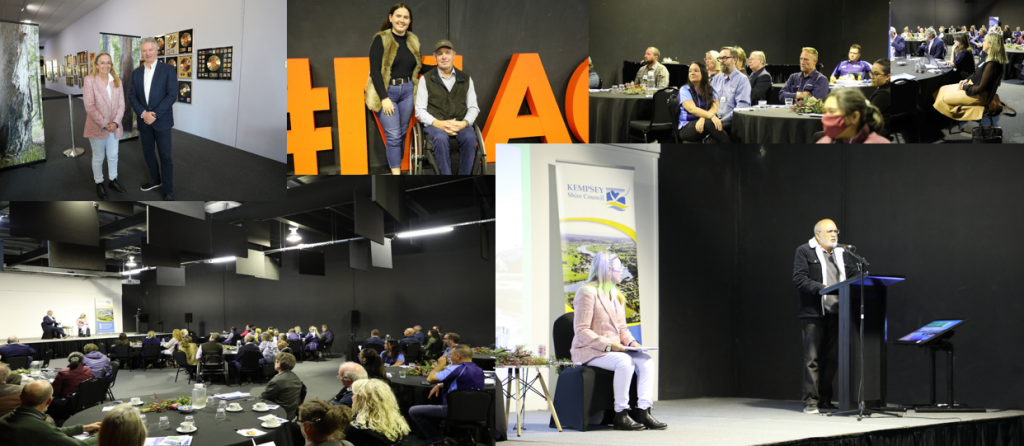
The Loxton region of South Australia is the central hub of the grain producing area of the Northern Murray Mallee but also produces a range of other crops including citrus, wine grapes and almonds, as well as livestock. However, this productive region experienced three years of drought between 2017-2019 and, at the time this project was put forward, was in its fourth year of drought, with more than 2,000 farming business affected.
Farmers and regional communities more broadly, face numerous barriers to accessing traditional forms of mental health support, due to reduced access to health professionals in rural areas, long waiting lists, stoicism, stigma around mental health and a tendency to minimise problems. There is often distrust of many health professionals and hesitancy in engaging with mental health services, who farmers perceive as not understanding their way of life.
Given these issues, and the significant impact that long-running dry had on the whole community, wellbeing had been a significant focus in the Loxton community. For example a sell-out musical, ‘Kick Off Ya Boots’, written by local farmer John Gladigau, and performed by locals, had successfully started conversations about mental health and wellbeing. The success of ‘Kick Off Ya Boots’ prompted Dr Kate Gunn, Clinical Psychologist, Founder of ifarmwell.com.au and Senior Research Fellow in the Department of Rural Health at the University of South Australia (UniSA), to continue working with locals, including the ‘Kick Ooff Ya Boots’ team, to implement what became known as the Vocal Locals project. In addition to providing a way for the community to better support one another, it was also an opportunity to further research the uptake of health and mental-health promoting behaviours within communities, especially as droughts are expected to increase in their frequency and intensity in coming years.
Supported by a $148,250 grant through the Future Drought Fund’s Networks to Build Drought Resilience program, this project was co-designed locally to enhance drought resilience by strengthening the capacity of professional, social and community networks in Loxton. The aim was to support mental health in local networks by training local ambassadors (i.e. the Vocal Locals) at events and via the freely available ifarmwell modules, and then supporting them to pursue their own wellbeing goals with a local wellbeing coach, and post about what they were doing for their wellbeing on social media.
In addition to drawing on many years of research in this field, conducted by Dr Gunn and her team, the approach built on the local success of a musical written by Loxton farmer John Gladigau, who agreed to act as the Program Coordinator. His musical ‘Kick Off Ya Boots’ celebrated rural life, explored challenges commonly faced by farming families (e.g. succession planning) and with guidance from Dr Gunn, incorporated wellbeing messages and tips to cope with difficult circumstances. The logic was that it would be powerful if individuals from the region saw similar wellbeing messages being reinforced by multiple local people they know.
There were five parts to the Vocal Locals project:
- Training: Ten ‘Vocal Locals’ and 17 other community members participated in a half-day mental health knowledge and skills workshop. A further half-day session for the Vocal Locals helped orientate them to how the Vocal Locals campaign would work, including how to brush up on their social media skills. The Vocal Locals also completed the five, freely available online ifarmwell modules, a tool for reducing distress and improving mental wellbeing among farmers, and encouraged others to do the same.
- Wellbeing coaching: Vocal Locals each completed eight wellbeing coaching sessions designed to help them pursue their own wellbeing goals, and post about them on social media.
- Social media posting: The local volunteers posted roughly once a week on social media about their wellbeing journey, and there was a public Facebook group created which attracted 870 followers, with 6,800 people reacting to, commenting on, or sharing the posts.
- Communications campaign: A broad communications campaign included a flyer drop to 2,500 households in Loxton, a two-page spread in the Riverland Football League match day program, interviews on local community radio, articles in The Murray Pioneer and the Stock Journal. The ifarmwell team also supplemented Vocal Locals’ posts on the public Vocal Locals Facebook page, with posts communicating six key wellbeing messages in different ways.
- Campaign dinners: Vocal Locals attended three dinners with the project team, with the last also involving family members and support people, and representatives from local organisations and government.
In an article written by ABC Digital, John Gladigau said it had been great to continue the conversations sparked by his musical.
“While these are not taboo subjects, we don’t talk a lot about mental health and wellbeing,” he said. “However, people are willing to [share] if they have the opportunity to.”
Mr Gladigau said he and Dr Gunn had been impressed with how open the participants had been in talking about their struggles.
“Even some of the really tough times… people have related to that and have jumped on and talked about their own experiences and encouraged each other. I think it’s about normalising those conversations,” he said.
Dr Gunn explained that the campaign was designed to operate at two levels.
“At an individual level, the initiative provided the Vocal Locals with the opportunity to learn more about mental health and wellbeing, and strategies that can help improve it, and to work towards their own wellbeing goals. At a community level, the initiative was designed to share practical, evidence-based strategies to help community members improve their wellbeing, increase their understanding of how to achieve positive mental health and wellbeing, and normalise talking about mental health and wellbeing and supporting others to improve their wellbeing.
“We have also been blown away by the creative ways that Vocal Locals used their role to get messages about mental health out into the community. They shared information about the initiative in their workplaces, sporting groups, farming systems groups, and agricultural bureaus for example. One Vocal Local who is also an egg producer, printed short messages on his eggs to raise mental health awareness – for example, one message was “give it a crack”. Another Vocal Local who included a photo of his ram wearing a Vocal Locals hat on the front cover of his ram sale catalogue spoke about the campaign to an audience of 80-100 local farmers just prior to the ram auction. The initiative has had such a profound impact on another Vocal Local that he pitched a radio segment to local community radio, to bring people together to share stories and talk about the ups and downs of being human. We are really proud of the impact that it had.”
Dr Chloe Fletcher, Research Associate, UniSA added that, “Our evaluation of the impact of the project in the Loxton community showed that there were statistically significant increases in the number of conversations people were having with others about mental health and wellbeing, their comfort in speaking to others about mental health, and their engagement in wellbeing activities.”
WATCH THIS VIDEO to see what the group said about the experience.
For more inspiring stories like this, head to our FY 2021/22 Annual Review.

